#READ MORE ABOUT ONE OF THE MOST WELL KNOWN SCOTTISH AUTHORS
Text
Just because I learned all of this when I read this book in Secondary School and want to do something during the downtime, I will be just going over the life of Robert Louis Stevenson. Will do this in various parts over the course of the story so that I don’t write one massive fuck off page.
He was born in 1850 in Edinburgh, Scotland, to a family of Lighthouse Engineers. His Father, Grandfather, and Uncles all being engaged in the engineering and design of Lighthouses. From a very young age it was clear Robert had inherited a weak chest like his Mother and Father, frequently having troubles with Coughs and Fevers. These issues would only be exacerbated by both damper climates and recurring bouts of Illness (while at the time it was viewed as Tuberculosis, some modern people think he may have had a different illness).
Because of his illness Robert had to take long periods away from schools (being taught by private tutors) and even when he did go to them he frequently had troubles due to being eccentric and strange looking. Despite being a late reader (learning how to read around 7 or 8) he would still dictate stories to his mother and nurse. While his father did hope for him to join the family trade he was still happy with his son having the hobby of writing stories, as he had done the same as a young boy before his father had forced him to stop (even paying for Robert’s first publication at the age of 16 “The Pentland Rising: A Page of History, 1666“).
Stevenson eventually joined the University of Edinburgh, studying an Engineering degree. However from the very start he brought no enthusiasm to the education, putting much more of his energy into trying to avoid classes and making friends through The Speculative Society, a society dedicated to public speaking and writing. Despite this his father still took him every holiday on a large trip to see the families Engineering Works. Stevenson still enjoyed the trips, but less for the engineering and more for the potential inspiration for his writing. By the time Robert finally told his father he planned to make his living through writing in 1871 (when Robert was 21) his father was described by his mother as “wonderfully resigned“ to this fact.
His parents convinced him to read law at Edinburgh University and be called to the Scottish Bar for some Job Security in case his writing went poorly.
In his 1887 poetry collection “Underwoods”, Stevenson reflects on his choice of profession:
“Say not of me that weakly I declined
The labours of my sires, and fled the sea,
The towers we founded and the lamps we lit,
To play at home with paper like a child.
But rather say: In the afternoon of time
A strenuous family dusted from its hands
The sand of granite, and beholding far
Along the sounding coast its pyramids
And tall memorials catch the dying sun,
Smiled well content, and to this childish task
Around the fire addressed its evening hours.“
#jekyll and hyde weekly#I know you can get most of this information from Wikipedia#But I feel I can at least describe it in a less Dry way#and even if it does just make you look up the wikipedia GOOD#READ MORE ABOUT ONE OF THE MOST WELL KNOWN SCOTTISH AUTHORS
32 notes
·
View notes
Text
You know, I think Clara knew about Amy.
Not at first, of course, but Clara grew up with her --- that is, grew up reading Amelia Williams books. And they were precious to her, books she's read many times over the course of her childhood -- how else does she know exactly which chapter holds what in the book she gave Artie? Perhaps she has always felt connected to her, this moderately obscure children's fantasy author, following in the footsteps of E Nesbit; this contemporary (and sometime friend (oh yes!) ) of Edward Eager's; although not nearly as widely known as either of these. Perhaps because of her choice to publish openly under a "woman's name", thus, in the time in which she lived, relegating her books to the inferior realm of "girls' books", despite the more than equal balance of male viewpoint characters.
But Amelia Williams is different from these authors too -- often fantasy, but sometimes more like early science fiction, a barely- recognized pioneer in both genres. Her views were feminist and daring. In so many ways she was ahead of her time, and the innovations she imagined! almost as if she knew what the future would hold.
And if Clara knows and loves her books so well, she can hardly fail to recognize the most frequently repeated character archetype in them. especially after she rereads a few on a subconscious hunch, during that summer after the Maitlands found a permanent nanny and she insisted that before anything else, she go off and fulfill her original travel plans from 101 Places To See. (The Doctor purported to leave her alone to forge her own way with this, but was in actuality very bad at that, and kept popping up nearly every place she went.) She's Clara, she's clever, how can she fail to look up from her book and notice that the person who's just appeared out of nowhere to stand in front of her with a plate of jammie dodgers and a goofy smile has stepped directly out of the pages?
And then of course, there are the dedications. Sure, there's normal stuff like "to my daughter", "to my loving and patient husband", and "to my parents, who are children now" which is rather weird and whimsical, but fits in with the fantasy author's signature style of dream-like imagination.
But the majority of Amelia Williams' dedication pages say things like "to You", "to My Doctor", "to My Raggedy Doctor" "to my raggedy man" (weird but clearly connected to the other variants), and, cryptically, over and over again: "to you", "to you", "to you", "to you (wherever in time and space you are)".
There's "to my imaginary friend" and "to my imaginary friend, and to all children who have an imaginary friend" and "to my imaginary friend, and every child in the universe who's ever met him, or ever will". Nerds and English teachers have occasionally debated what, if anything, she meant by all this, and now Clara thinks she knows, but she can never say....
And then there are the nights that the Doctor wakes up crying out for "Amy!" and then refuses to talk about it when Clara asks, refuses to acknowledge ever even knowing an Amy, "well everyone shouts random things when they're asleep, it doesn't mean anything" and "I don't remember." if pressed for details about his dreaming. And later he might go off somewhere and cry quietly, reading a book he never lets Clara see.
And then he regenerates, and calls out for "Amelia!", "the first face this face saw."
There's newborn twelve, with his Scottish accent, letting her name slip. It's the first - and only - time he's spoken of her while awake and not actively dying. And Clara is too busy with the immediate threat to their lives to think about it in the moment, but at this point she at the very least has a hunch about the connection between him and the Scottish-American author with the rather opaque background --- that as far as anyone can trace it (although to be fair, no one really cares enough to try very hard) she and her husband just kind of appeared out of nowhere in pre-WWII New York. It seems kind of obvious, now, that the doctor would have had a hand in that.
And now with all the books everywhere, the library gradually migrating into the console room, what else is obvious is that he owns every single one of her books. multiple copies, first editions, last editions, signed copies, mass paperbacks, everything. There's a TARDIS key hidden in a well-worn, well-loved, tear streaked copy of The Cuckoo And The Doll's House, which Clara finds when she's cataloging all the locations of TARDIS keys, just in case she should ever need that information one day.
This all is enough for Clara to know. There doesn't really need to be any more proof, but there is. What totally and fully clinches it are the pictures. Tucked in the pages of another tearstained book (The Beast Below this time), are photographs of Amelia, looking just as she does in her black and white author photos, but younger, and in 21st century clothes. Elsewhere, later, she finds photo booth polaroids of a still younger Amelia, goofing off and smiling. Some of them feature another young man Clara doesn't recognize, and some of them feature the Doctor. He's wearing a tweed jacket instead of his purple wool, and no vest, but otherwise he is exactly the same as the Doctor she first met. The three of them hang off each other like old friends, like family.
idk how to end this.
#clara oswald#amy pond#augh i just! so many feelings about post-TATM writer Amelia#she made the doctor up and then she grew up to Make Him Up professionally#she created him she created him she created him#lavender thoughts#dw#ndw#doctor who#meta#ANOTHER dw ficlet/meta in one day i am on a roll#like six half finished ones in my drafts too btw
256 notes
·
View notes
Text
Interesting things abt PGR
Things I want to put into a video but I’m really fucking lazy so....
ALSO
Massive spoilers for PGR’s main and extra stories, including hidden. And character interludes. You have been warned
- Remember Bruce from Fostered by Blade and Cyril from Land of the Fallen star? Watanabe’s interludes? We know they’re father and son, but did you know that they’re Scottish? Cyril’s nickname, The Beak of Islay clues us into this, as Islay is an island in Scotland.
- Nikola isn’t actually part of Kurono. Idk why but my dumb of ass (and a other people from what I’ve seen) thought that he was with Kurono in some way. But, he actually left it long before the main story.
- Speaking of Nikola, despite how cold he seems, he is scared of one person: Collins, the leader of Kurono. It’s not explicitly stated, and we don’t know why, but Collins was his superior and even after leaving Kurono, he has leverage over Nikola. Spicy.
- While we’re still on the topic of command, despite how Nikola and Hassen seem at odds with each other in earlier chapters, they actually work pretty well together and seem to go back pretty far. I will do a whole other analysis post of command/pgr npcs bc they’re so interesting. (And I’m also filling the void where the Dominik’s orphan’s comic is supposed to be, idk if it ever got updated ueehh)
- Idk if anyone else noticed but in Inscription of Labyrinth but when you first walk up to Luna and Lucia’s old home, you see a shadow dash away. That’s Roland, as you later find out in the Hidden Story.
- Pfaff, Rosetta’s grandfather, shares a name with a name with a sewing machine manufacturing company. Idk, it was interesting to me since they have Pfaff sewing machines at my school. Pfaff is also a German name, so Pfaff and Rosetta (if she’s related by blood which idk if that’s been confirmed) are possibly of German origin
- Kowloong as we all know is inspired by East Asia, mostly China. The description supports this and says that Kowloong is made up of mostly coastal east Asian cities. So there are three possible candidates for Kowloong’s location:
Shanghai, as it’s one of China’s most prominent cities
Hong Kong is also a strong candidate, as it is also a port city
And Hong Kong Island, you know, and island surrounded by water.
- Watanabe wields two kukri knives, a type of machete originally from India but heavily associated with Nepal.
- Asimov is named after the sci fi author Isaac Asimov. It’s pretty fitting, since Asimov is responsible for designing construct frames. Double fitting since constructs fit nicely with Isaac Asimov’s three laws of robotics:
1) A robot may not injure a human being or, through inaction, allow a human being to come to harm.
2) A robot must obey orders given it by human beings except where such orders would conflict with the First Law.
3) A robot must protect its own existence as long as such protection does not conflict with the First or Second Law.
Someone on the PGR writing team really loved sci fi lol
- The second agent, Vonnegut is also named after an author. Kurt Vonnegut, known for his dark humor in his novels. Interesting, since I believe that Vonnegut says only to call him Vonnegut, meaning it is not his real name. I wonder what prompted him to choose it, but trying to answer that means actually researching Kurt Vonnegut which is... uh... not something I want to do on a weekend. Since I would probably have to read the synopsis of every single one of his works which he has well over 27 of since more were published after he died, and they’re not all novels. Someday, perhaps.
- Nanami says yeet. I think it’s in chapter 7 or 8 hidden story but she says yeet. I don’t know how to feel about this. It has been haunting me for the past year.
- In Roland’s interlude, he is an actor on the Mansdati show (I think glbl renamed it but I forgor) in which the main character, Mansdati doesn’t know he’s actually in a show and is just living his regular everyday life while everyone around him are actors. It’s basically the Truman Show, an old movie with the same premise. Except without robots and depressed clowns. (maybe? idk I haven’t seen that movie in a while. It’s pretty good tho, watch it)
And that’s it, that’s all I got. Let me know if I got anything wrong.
36 notes
·
View notes
Note
get to know you asks!
If you could visit anywhere in the world, where would it be?
If you could live anywhere in the world, where would it be?
What's your favorite color in general? To wear? To use in artwork?
How did you get into writing?
Do you have a favorite book? Favorite author?
If you could take one trait from any animal (tapetum to see in the dark, prehensile tail, claws, etc.) what would it be and why?
What's your favorite type of cuisine?
Do you have a favorite superhero character? Not necessarily the hero themself, anyone from that universe (so you could say Spider-Man or Aunt May, that's what I'm saying)
Do you have a favorite time of day? Why?
Have you ever had pets? What pets would you want in the future?
Thanks for the ask!
1) If you could visit anywhere in the world, where would it be?
I have a laundry list since I've never left the country. But to name a few... London, England; Scandinavia as a whole; Rome, Georgia to see the Creel House if it ever becomes an AirBNB so I can stay in it for a night; Montepulciano, Italy; and some tropical island, idk which one.
2) If you could live anywhere in the world, where would it be?
I'm lucky I live in a state that's very... we'll say progressive and it's well known for being so, and I feel very comfortable here. However I've lived here for basically my whole life (wasn't born here, unfortunately) and I keep saying I wanna live somewhere else for a while. Boston's very high on my list since I love the culture and history. But I feel like living in England or even a small Italian town would also be fun.
3) What's your favorite color in general? To wear? To use in artwork?
In General - Sea Foam Green (the color of my walls; I provided the exact paint color name)
To Wear - My favorite clothes are in a Grey-scale
For Artwork - I love shades of blue, but in particular dark blue



4) How did you get into writing?
I've always been fascinated by coming up with alternate endings, but my hobby really took off when my middle school best friend and I wrote some... really god awful Star Wars fanfics lmao. We spent soooo long on those, meeting up via Google Docs to write them after school for months. I cherish the memories, not the fics.
I got further into it when I started writing Avengers fics which then just evolved from there... and now I unironically write Twilight fanfiction so you make the call on how this went for me lol.
5) Do you have a favorite book? Favorite author?
I have so many of both.
Authors is a shorter list:
Christopher Paolini
Neil Gaiman
George R.R. Martin (we're waiting, mister)
Rick Riordan
The icons Shakespeare and Marlowe
Mary Shelley
Basically all my Tumblr author friends because you're awesome.
I wish I had more female authors, but unfortunately most of the ones who I've liked reading are ✨️problematic.✨️
Books is a longer list, I'm sorry:
"Wonder" by R.J. Palacio is one of my all time favorites and I recommend everyone to read it who hasn't. Beautiful story and I share a name and a hobby with one of the characters!
"The Strange Case of Dr. Jekyll and Mr. Hyde" by Robert Louis Stevenson. Musical is absolutely fire, too.
My favorite of Martin's "A Song of Ice and Fire" series is "A Storm of Swords," the third one
Neil Gaiman's works are amazing, but one of his littler known books is "Odd and the Frost Giants" and it's a very funny story. (I have bought a copy of "Good Omens" to read, don't worry, it's just with most of my other books in a box for the summer for apartment move-in. "American Gods" is also on the list after my dad read it.)
I'd be dishonest if I didn't include "Doctor Faustus" by Christopher Marlowe because it's such a goofy little play. I'm glad my poor life choices led me to it 👍
I should also mention that my favorite Shakespeare play is "The Scottish Play"
Claudia Gray's Star Wars tie-in, "Bloodline" is a fascinating read as well, about Leia in the New Republic era navigating her political career and personal adventures while trying to hide that she's Darth Vader's daughter.
Similarly, as a kid I was obsessed with the series of short novels, the "Strange Case of Origami Yoda" book series by Tom Angleberger. Just middle school kids balancing their personal weirdness and hard-ass school policies with Star Wars through origami.
Jennette McCurdy's "I'm Glad My Mom Died" was also a really good read.
Another autobiography I'd recommend is Carrie Fisher's "The Princess Diarist." I miss that woman very much.
...Alright I'm just gonna come out and say it, for all its faults, I like "Breaking Dawn" and I'm actually hunting for a thrift store copy as we speak. Garrett's speech is actually pretty dope and, after noticing the frequency that it happened, I tallied how often Aro had to tell someone to chill the fuck out, put it into a pie chart, and you'll never guess who had to be told to shut the fuck up the most...

Which is hilarious
6) If you could take any trait from any animal, what would it be and why?
I'm basic, I want wings. Bat wings (like Emily tbh) cause bug wings are too fragile and I don't wanna deal with feathers like on bird wings. Why? Cause even if I'd be a flightless creature, it'd look awesome, that's why.
7) What's your favorite type of cuisine?
I'm a whore for noodles. So Italian and Chinese. We've gone to this one family-owned Chinese place for so long and so often the owners know us by name, they have conversations with us when we eat there, and are always commenting on my brother's height since they remember us from when we were tiny little ones (he's over six feet tall now)... and to the point, their chicken lo mein is to DIE for.
8) Do you have a favorite superhero character?
I have a couple, but in particular I like Loki, the Osborns, Wanda Maximov/ff, and, obscure character alert, Verity Willis from the Agent of Asgard comics because one, sans tattoos, she's very cosmetically similar to me with the glasses, dyed purple/red hair, etc. two, she's snarky and just kind of a badass, and three, she's Loki's best friend and how many people can say that they made friends with a guy like that?
(I don't wanna say her tattoos inspired Emily's, but I feel like they'd get along swimmingly)
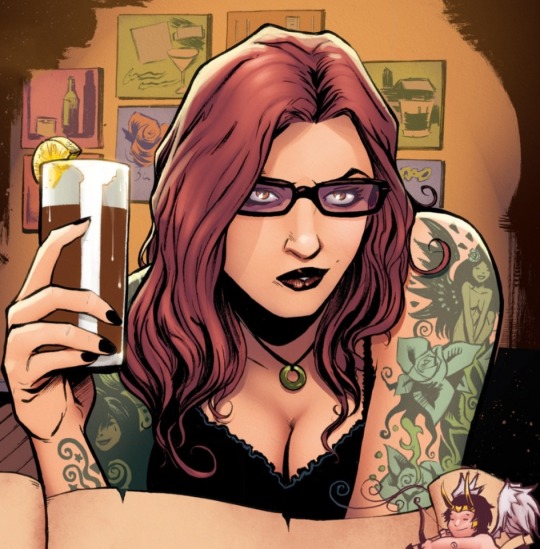

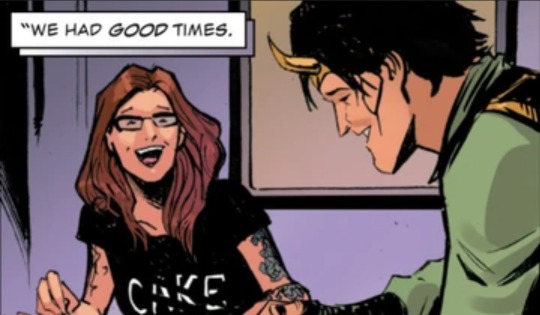
9) Do you have a favorite time of day? Why?
I've always liked it when the sun's gone down but the sky's still blue, especially in the summer when here it cools down to perfection... oh dammit, that's technically twilight, isn't it?
10) Have you ever had pets? What pets would you want in the future?
We used to have two kitties a looong time ago, but now we have these two buffons:


At some point I'd like a turtle or a lizard though... maybe a cat of my own further down the line.
#fishgills speaks#ask game#fishgills ask box#get to know me asks#ask me things#beloved mutuals#my inbox is open
4 notes
·
View notes
Text
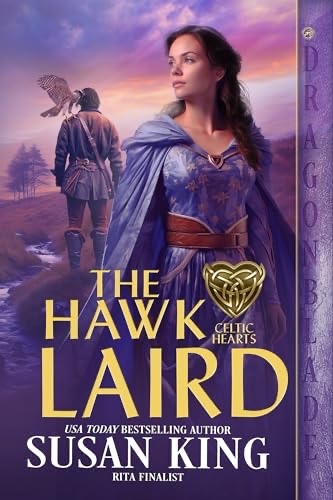
Book:’’ The Hawk Laird” formerly ‘’Laird of the Wind”
Author: Susan King
Series: Celtic Hearts, Book #1
Publisher: Dragonblade
Length: 340 Pages
Overall Rating: 5/5 Stars
Blog Rating: 5/5 Saltire Flags
Scottish Lowlands, 1305
This book starts with Lady Isobel of Alberlady who is a prophetess and tells the future, also known as Black Isobel due to her long, dark, raven hair. As could see the future: she saw a vision of William Wallace being betrayed by people he thought he could trust and would die because of the hawk! Now one of the men who betrayed him is trying to get himself out of prison but goes to William to warn him not realizing he had been betrayed too! Except this vision was not absolutely accurate as most of her visions were metaphors. When Jamie realizes William has been caught he knows the English will torture him and give him an agonizing death! Jamie tries to give his friend a quick, painless, death, unfortunately his arrow missed his mark! He is accused of betraying him which is not the truth!
Now it turns out the Hawk is Jamie Lindsay the former Laird of Castle Wildshaw who is misinformed about this prophetess, thinking she has helped ruin his name unfairly plus she is also betrothed to his enemy Sir Ralph Leslie! He was given his castle by the wicked English King, since Jamie is a hunted Scottish outlaw and Leslie is a Scottish turncoat who sides with the English betraying his own people! Jamie had expected Black Isobel to be an elderly crone, not a beautiful goddess forced to accept Leslie’s marriage proposal by her father and their Priest! However everyone is using Isobel for her abilities and she knows it too. Furthermore Lady Isobel’s castle is under siege where she and her people are starving! She is also a Scot and very kind and caring too which was very unexpected to Jamie.
Isobel has been misinformed her entire life by men saying she is protected and not able to leave her own castle due to her godly gifts. This was because she was a prophetess and because she is also just a feeble, weak, woman! She realizes now she had been held captive not protected as even her own father was being advised by their priest. Isobel was expecting James “Jamie” Lindsay who she thought was her champion and savior since he saved her from dying as the English attacked her castle burning to the ground. She soon discovers he only came to make her his captive to trade her for his cousin Janet who was taken as a captive in his place. Ralph Leslie is a man she detests and only wants her for her supernatural abilities, to make him more respected and wealthier by the English nobles. Soon Jamie reveals he lives in Ettrick Forest but takes Isobel to his secret lair where only a special few outlaws like Wallace knew of its existence. He realizes he had been wrong about Isobel and feels truly torn. They also discover a Hawk where Jamie had been a falconer as well as Isobel’s father so she is no stranger to the birds. They train the bird together and fall in love.
However soon time goes on as Jamie hates her heartless betrothed Sir Ralph Leslie, a turncoat Scot who sides with the English as Jamie wants to save his cousin Janet. He wants to trade captive for captive. The problem is he is in love with Black Isobel! Except he has nothing to offer her being on the run, being hunted and living as an outlaw in the forest. He feels Ralph can give her a peaceful existence except Isobel refuses to go! She rather be on the run with Jamie as he has given her first feel of freedom and rebels against all of those who had tried to keep her hidden because of her abilities where she was truly captive. On top of that Jamie does not know what to do as he loves his cousin like a sister but is madly in love with Isobel. What will Jamie do to trade Isobel to a man that only wants to use her or leave his cousin as a captive?He is between a rock and a hard place and does not know what to do? Read and find out.
Susan King has always been a favorite author of mine. I read this under ‘’Laird of the Wind’’ many years ago and I love Scottish history. I loved revisiting this book again number one when I read it the first time I had not been to Scotland yet. Now I have been to Scotland and been to specific sites she described in this book like Dunfermline Abbey. I too have been to the thorn tree where allegedly William Wallace’s mother was buried where it is still marked today.Also King Robert the Bruce’s body rests at Dunfermline Abbey. Furthermore I am so excited Susan King is with Dragonblade Publishing now being one of my favorite publishers too! I can’t wait to read The Falcon Laird next!
Celtic Hearts
Book 1 - The Hawk Laird
Book 2 - The Falcon Laird
Book 3 - The Swan Laird
Disclaimer: I received a complimentary copy and an advance reader copy from Dragonblade publishers. I voluntarily agreed to do a fair review and blog through netgalley. All thoughts, ideas and words are my own.
0 notes
Text
Who Kills Sherlock Holmes In Real Life?

Arthur Conan Doyle invented the completely fictitious Sherlock Holmes in 1887. He is an advisory detective from England and resides in London at 221b Queen Street. The Scottish author Arthur Conan Doyle invented the completely fictitious detective Sherlock Holmes. Sherlock Holmes, the forerunner of the modern ringleader detective, made his debut in Beeton’s Christmas Annual, an 1887 publication of Conan Doyle’s A Research in Scarlet.
He hunted down lawbreakers all through Victorian and Edwardian London, the south of England, and continental Europe as the first and only “consultancy services detective” in history. Sherlock Holmes made a unique impression on the public’s fiction and has remained the most enduring figure in the detective novel.
Sherlock’s Autobiographies and Memories
At first, Arthur Conan Doyle named the detective Sherrinford Holmes and the biographer Ormond Sacker. But he changed his mind and renamed them, Sherlock Holmes and John H. Watson. All sentiments, and that one especially, were offensive to his cold, straightforward, but admirably level mind. He was, I accept it, the most excellent reasoning and the following machine that the world has noticed, but, as a fanatic, he would have positioned himself in a false situation.
He believed that attachment is an emotional thing, and whatever is passionate is objected to his accurate, cold logic, which he identified above all something. He could examine a client as objectively as a scientist would examine a specimen. He had a Saturnian appearance at times. His manner was not effusive. While his emotions were dulled by long periods of overstimulation, his intellectual perceptions were extremely active.
Sherlock is a novel-based crime drama series
Sherlock Holmes is the most well-known fictional investigator personality in the entire world. He has been the inspiration behind many writers’ attempts to create their own fictional detectives. The British writer named Sir Arthur Ignatius Conan Doyle, who is known as Sir Arthur Conan Doyle, was formed by the wise and intelligent Sherlock Holmes. He started working on his book in 1886, but it eventually got published in 1887.
Sir Arthur Conan Doyle has written a total of four novels and 56 short stories about Sherlock Holmes. He is also Sherlock’s friend and biographer. He also helps Sherlock with his investigations.
Why was Sherlock considered unique for a common man?
Although Holmes has a reputation for being a very emotionless and impersonal person, he can get quite excited when conducting an investigation. Additionally, he yearns for some acknowledgment of his divine abilities. To impress everyone, he always tries to keep his techniques and supporting materials a mystery until the end.
Without a doubt, his investigative abilities have resulted in the arrest of numerous criminals. As a result, he now has a large following. There are also a lot of enemies. Professor Moriarty, also known as Moriarty, is one of them. He most likely complements Holmes’ impressive abilities the best.
And he is the cause of Holmes’ demise. No doubt how much fans have praised Sherlock’s novel, as well as the drama and the intelligence of Sherlock’s way of solving cases, has made fans always want to read and watch more of it.
Who kills Sherlock Holmes in real life?
Sherlock Holmes is a nonfictional character who is killed by the author's scriptwriting. Author Conan Doyle decided to remove Sherlock from the final episode by writing a script where he has written that Sherlock is killed in the final episode. Conan in the story put an imaginary professor named Moriarty who was defeated by Sherlock and decided to take revenge on him by killing him. The author decided to kill Sherlock because he no more wanted to share his literature with the channel anymore.
Well, after the murder of Sherlock it made fans disappointed and wanted him back on television. After a fan reaction and sadness over it writer decided to rebirth the lead character. In his novel the hound of the Baskervilles, he reintroduced Sherlock with a new twist of investigations and detective skills, which makes it more interesting to watch.
Read the full article
0 notes
Text






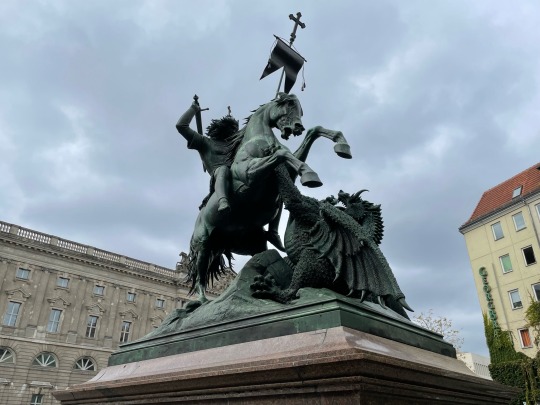

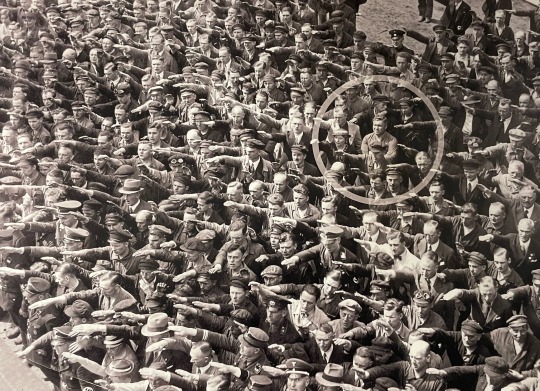

After Amsterdam I went to Brussels for three nights. When I told my Ukrainian bunkmate that I’d be staying three nights he exclaimed “you’ve given this city too much respect!” It definitely wasn’t the most exciting stop on my trip but I still enjoyed my stay. Part of the reason was because I booked a hotel with dorms instead of a hostel so there wasn’t much of a social atmosphere. I took a day trip to Bruges which was nice. A very pretty and touristy little town.
I found a good chess book that I’ve been enjoying. Usually when I try to read books on chess they’re either too rudimentary, too advanced or too dry to hold my attention. This one is at the appropriate level and there’s actually quite a bit of humor in the writing, which I think might not be so common among chess authors. I also spent some time listening to podcasts about dopamine regulation. Dopamine is commonly known as the “pleasure chemical,” which is somewhat accurate, but it has everything to do with motivation and focus. I’m not well-educated on the topic, but it seems to me that understanding how to effectively manage my dopamine reward system will be essential to making the kind of progress - and more importantly finding the type of fulfillment - that I want in my life. Some general takeaways are that activities that cause a large spike in dopamine levels (using social media, playing video games, certain types of drugs etc) make it much more difficult to subsequently enjoy activities that are less exciting (like reading a book about chess). So by reducing or removing these types of activities, you can basically train your brain to reward you for comparatively more mundane tasks. How much more could I do if I simply enjoyed the act of improvement instead of chasing the highs of accomplishment? I would be able to achieve new levels of mastery while leading a more fulfilling life. I suppose that will be a major focus moving forward - heavily moderating any activity that spikes dopamine levels too easily, especially without adding any real value to my life.
This is my fourth and final night in Berlin. An interesting city. I spent most of my time roaming the streets. I met some very interesting people, though I still spent most of my time alone. On the first night I met a 34-year-old from Uganda named Calvin. I’m very glad I ran into him, the conversations I had with him are among the most valuable I’ve had on this trip. He owns two businesses with his wife but was originally trained as a doctor. He still goes on medical missions with some frequency and is heavily involved with a nonprofit. I’m at a point in my life where I am searching for purpose, and his perspective was invaluable to me as someone who’s found his own. He spoke of the gratification and fulfillment that comes from giving to others with no expectation of receiving something in return. We talked about how focusing too much of your energy on yourself brings you out of balance, and that is all too common in Western societies and in capitalism. If you want to be happy, help others find happiness. If you want to find purpose, help others find purpose. It seems that much of what I currently struggle with does not have a direct solution. Calvin also sold me on visiting Africa through his nonprofit, and pitched me (someday) starting an NGO to help young Ugandan entrepreneurs understand and leverage data to support their businesses.
Other notable Berlin friends include Dodo, an adorable older Taiwanese woman with somewhat broken English. We had a drink at the hostel bar last night and she told me all about her family and travels. I didn’t understand a lot of what she said so I did a lot of smiling and nodding. She thanked me for helping her practice her English. Very wholesome. While waiting to check in to the hostel I met a group of Scottish mothers with teenage children (that they left in Scotland). Moms love me. Apparently they work in fintech and one of them jokingly offered me a job. I think she was pretty high up in the company, I bet that could’ve turned into an actual lead if I showed more interest.
I also met Melanie, a 27-year-old from Amsterdam that seems to have a deep understanding of who she is and what brings her joy. She’s been sleeping in the bunk below mine and we’ve had some pleasant conversations. Tonight we were both in the room looking for places to eat so I asked her if she wanted to go somewhere together. She said no, she’d like to be alone. Kind of a funny situation - in another context that could be interpreted as as her not liking me. I get it though, she took this trip to be alone and reflect. We had another nice conversation when we got back. I always enjoy speaking to introspective people.
At times I wonder if I’m traveling the “right” way, but I know this is a trap. In Barcelona when I went to the bunkers to watch a sunset it was pretty crowded and I found myself spending a bunch of time looking for a good place to sit. I had a thought - a great way to waste a sunset is by looking for the best view.
Prague tomorrow.
1 note
·
View note
Text
take care
James Potter x Hufflepuff!fem!reader

Warning: mentions of death, angst, fluff
Author’s note - hey y’all!!! So I haven’t written a one shot in a while, but I had this idea in my head and I couldn’t help but write it out, so I hope y’all enjoy!! Also, I know the end is not the greatest, but I couldn’t think of a better ending, so pls go easy on me 😅😌 edit: I forgot to mention this is a Hufflepuff!fem!reader one as well! 😅
If there’s one thing that you know for certain in this world, it’s that James Fleamont Potter has your heart in so many ways, and he doesn’t even know it yet.
You’ve known the hazel-eyed man since you first met him in fifth-year. You had previously only heard about him in passing, thanks to the tricks and shenanigans he and his best friends, the group lovingly dubbed the Maurauders, came up with to taunt the Slytherins and other fellow classmates. James was also an exceptional Quidditch chaser for Gryffindor, making his way up to captain by your third-year, and was adored by plenty of girls and guys in your class. And yet, the brunette never crossed your path until Professor Slughorn had you two paired up for a week-long project.
You were the envy of everyone when Slughorn announced the pairing, and at the time, you were only upset because you had hoped to be partnered up with your best friend, Pandora. You had looked over to see the wild-haired boy meeting your gaze, giving a kind yet goofy smile. You had returned the grin as he made his way over to your desk, and the rest is history.
It’s really hard not to like James Potter, considering he is the most charismatic, charming, kindest person you have ever known. He is also the most talkative person you’ve ever known, which was, at the time, something you had to get used to. You were a bookworm by nature, always loving to get lost in a good muggle story and learning new and exciting things about the wizarding world you grew up in, so being around a very extroverted person was a whole new challenge in and of itself. However, by Godric’s good graces, you two got along quite well, with James bringing out your more communicative side and you introducing him to the world of muggle literature, which he was absolutely astonished with (and got Remus Lupin wondering who the hell you were, to have James Potter interested in reading anything).
You didn’t know exactly when it was you started to fall for the man that became your best friend, but it came suddenly and all at once, your heart fluttering at every pet name he would give you, cheeks flushing crimson whenever you would feel his strong, muscular arms drape around your neck when you would talk in a group setting. You hated the idea that you were living proof of the ‘I fell for my best friend’ trope, but your heart couldn’t help but soar every time you laid eyes on James, and it lurched when you realized that it would never be reciprocated. The reason being? The hazel-eyed boy only had eyes for one person - Lily Evans.
Everyone knew how head-over-heels in love he was with her, and honestly, it was hard not to love Lily Evans. She had the sweetest, caring heart, and was a major ride or die friend to all she loved most. She was smart, witty, and absolutely breathtaking, with hair the color of an autumn sunset and eyes like fresh sage. James spent practically all of his Hogwarts years pining for the girl, until she finally caved into his advances in sixth-year. Watching James fall even harder for Lily physically pained you, because you so longed for that to be you - to be the one James doted over every day, have him hold your hand as you walked down the long halls of the Scottish school, to be able to kiss him and feel all of him. And boy, did it hurt worse when he married her after school ended.
Now let’s get things straight - you were elated for your best friend. You wanted James to be happy, even if it wasn’t at your expense. James Potter deserves the world, and if it wasn’t with you, then that’s what it was to be. You were in Lily’s bridal party, the two of you becoming friends not long after you and James, and you were given the honor of being godmother to their first child, a son which they had not too long after their nuptials, along with Sirius Black, another friend you’d made thanks to James. You were happy for both of your friends, living out their perfect lives and building a life together - but oh how you wished that were you.
After the birth of Harry James Potter (“this one has to have my name in there somehow”, James had protested at a baby shower when asked about names for the child, which caused every one of the Maurauders and you to roll your eyes in jest), you decided to let your childhood crush on your best friend go to rest. He was happy, with a whole life that you couldn’t bear to mess up with your feelings, and you needed to move on. Pandora and Regulus, your only Slytherin friend who happened to be Sirius’s brother, had a long discussion with you the night after Harry was born about the matter, and they agreed to help get your mind off of James Potter romantically, for good. It was hurting them to see you hurt every time James and Lily did anything together, and none of you could bear that pain anymore.
For that whole year, you threw yourself into your work. You found a job at the Department of Mysteries at the Ministry of Magic, a position you had been longing for since you were taking your OWLs. The position you held was so top-secret, as is all positions in the Department of Mysteries, you couldn’t even tell your family or friends about it. You loved going into work every morning to something new and exciting, knowing what you were doing was for the greater good. You even dated around a little, much to the chagrin of the Maurauders - especially James, who was always playing protector when it came to guys you dated. You were living quite a normal life for once, your feelings for James being pushed into the very far corner of your mind and heart. Everything seemed perfect - until Halloween 1981.
The rumors of Voldermort rising in power was heavily discussed in the Ministry, especially when it came to your position. You heard even more rumors that his followers were infiltrating the Ministry, and paranoia was rampant everywhere. As being a part of the Order of the Phoenix, you also knew who became Death Eaters, and what to watch out for. Dumbledore had mentioned in a meeting that a prophecy was given about a child that would stop Voldermort, but no one could’ve guessed who it was about, considering the prophecy spoke of a child born in the summertime, and it wasn’t only James and Lily who had a baby around that time. Dumbledore placed Secret Keepers for both the Potters and Alice and Frank Longbottom, the other couple who had a child the same time they did, and everything was presumed to be safe.
That Halloween night changed everything for the Maurauders, the Potters, and you. Knowing that Peter Pettigrew, the fourth Maurauder and the Potters Secret Keeper, gave the family into Voldermort’s hands had you wanting to kill the traitor yourself. However, knowing that Lily Evans-Potter sacrificed herself for James and Harry, in order to give them a better life, was the thing that broke everyone. Her love for her family was strong enough to stop Voldermort, but the loss of a beloved friend overshadowed that.
After Halloween 1981, James Potter changed significantly. He wasn’t his happy-go-lucky, bubbly self anymore, just barely getting by to be good enough for his son. The light had dimmed from the man’s eyes, and everyone was trying so hard to bring that light back, to help James come back to himself. But you knew - your best friend lost his first love, the mother of his child, this wasn’t something that was going to heal quickly. So you took to the only way you knew how to help out your first love, by just simply being there for him.
You took time out of your days to go check on him and Harry, leaving work early enough to be able to have nightly dinners with the two. You watched Harry when James needed time to rest, with Sirius helping out from time to time. You always called every morning to be sure James was up and functioning, sending your owl to him with a fresh brew of light roast coffee in a Thermos with a word of encouragement. You would often go to the Potter residence to just be a presence for James, your own being as a reminder that he wasn’t alone. It took him a while, but your acts of service and words of affirmation brought him back to himself.
James wasn’t one that was ever good with saying he needed help, but you just knew. It was one of the things he loved most about you - you were a comforting presence that always knew exactly what to do or say at the right moment without even trying. You truly cared for your friends, and never let them go without knowing how much you did, and you’d do even the littlest of things to show them that. You helped James so much in that year after Lily died, shining a light so bright in that darkness that consumed him. He couldn’t help but start to see the other wonderful things about you - the way your eyes lit up when your favorite muggle song played on the Potter’s charmed stereo, how your hair would delicately fall out of your claw clip to frame your face, and how Harry trusted you enough to want only you to read him a bedtime story, much to the chagrin of Sirius. You helped him piece his life back together, and mend his heart in the process.
One of the things the Maurauders were good at was noticing how the other was feeling. Remus and Sirius took note of their best friend’s feelings for you one autumn night, after the trio, you, and Marlene McKinnon and Mary MacDonald finished your bi-weekly game nights at James’. The couple saw how whenever you would laugh at Marlene’s jokes, James would flush scarlet, a lovesick look in his eye just by your hearty chuckle alone. They also saw how he would glance at you from time to time, admiring your features as if you were a painting in the Met. The duo pulled James aside after everyone left to confront the brunette, eager to hear him confess that he finally came to his senses about you.
“What, y/n? Nah, I love her as a friend,” James stuttered, his hands clamming up with nerves.
“Oh come on, James,” Remus scoffed, the lycanthrope’s arms crossing in disbelief, “we know you don’t just love her as a friend.”
“We’ve seen the way you look at her, Prongs,” Sirius chimed in. “It’s the same look you gave -“
“Don’t,” James interjected, then sighed as he looked between his two best friends, who were already staring him down. “I dunno what to do now. Here I go developing a fat crush on my best friend, not even knowing if she feels the same.”
Sirius let out a booming laugh, causing James to give him a curious look. “You don’t know, mate? Y/n’s had a crush on you since year six, after that project you two did for Slughorn.”
“No way,” James huffed, face twisting in disbelief. “That’s not true… is it Moony?”
The sandy-haired man stared at James with a wide-eyed look, fishing for a cigarette in his grey coat pocket. “I can’t believe you didn’t see it, Prongs. Everyone knew about y/n… the girl would’ve done anything for you.”
“Still does, even now,” Sirius chimed in, taking the extra white tobacco stick that Remus offered him. “I mean, look at all the shit she’s done for you.”
James’s mind raced as he thought back to all of the help you had given him over the past two years since that night, and it all clicked for him. You cared about him… there’s a chance.
“Go get her, mate,” Sirius spoke, clapping a hand on his best friend’s broad shoulder, blowing smoke from his lips. “We’ll stay and watch Harry for you, just go to her.”
James gave the couple a grateful look as he thanked them, running to grab his coat to go look for you. He knew by the time their conversation had ended, you already disapparated to your apartment in Diagon Alley. With one final look of thanks at his best friends, the raven-haired man and the sandy blonde giving him a “good luck” smile, he disapparated right outside of the brownstone, a wave of nerves turning tides in his stomach. He had no idea what he was going to say to you, or how he was going to, but he knew it was time to finally confess, to have you with him for the rest of his life.
James walked up the steps of your apartment, knocking on the door nervously. You opened the door a few seconds later, in a pair of black and yellow Hufflepuff sweatpants and an oversized Sublime crew neck, your hair twisted up in a goldenrod hair clip. Your face twisted in confusion at the man standing in front of you, his already wild curls in a disarray, eyes wide.
“James, is everything okay?” You questioned, making sweater paws from the frigid breeze.
“Can I come in?” James asked, stuffing his hands in his black pea coat.
You nodded as you silently let him in as he took a look around your lived-in apartment, full of Hufflepuff memorabilia and cozy linens. Hung in the corridor were pictures of your family, starting from when you were little, and James noticed that you also had pictures of your friends from Hufflepuff mixed in with pictures of the Maurauders. He scanned the moving pictures until he landed on a candid picture of the two of you from your sixth year. You and the Maurauders had just successfully finished pulling off a dung bomb prank on Slytherin house, and had reached Gryffindor tower to recouperate. James sat on the long, red couch in the middle of the common room with your head in his lap, laughing hysterically at the prank. He remembered Remus took the photo upon entering the common room, wanting to commemorate their first prank of the new school year, and the picture did nothing to calm the tides turning in his stomach. He studied your face in the picture, noticing how your y/e/c eyes shone with such light in them as you looked up at him, so much… adoration that he had never noticed before, causing his heart to race.
“James, what’s going on? Are you and Harry okay?” You asked, breaking him from his thoughts.
James turned away from the picture to look at you, his heart racing even more at the sight of you. “We’re both okay, just needed to talk to you.”
“Okay…” you spoke, walking over to your living room to sit on your burgundy couch. “What is it you wanted to talk about?”
James sighed as he followed you, stopping to face you. “Well…”
You waited patiently for him to finish, urging him with a look. Well here goes nothing, James thought to himself. “You have been there for me through everything, y/n, through all of the good and the bad. You’ve been there when I lost Lily, and have helped me to raise Harry. You helped me come back to who I am, saved me from myself, and there’s nothing that I can ever do to repay you for that.”
Your gaze softened as you reached for his hand. “James, you don’t have to do anything. I care about you both and would never let you do life alone.”
“Do you?” James asked, bending down to your eye level. “Do you care about me?”
Your breath hitched in your throat. Did he finally find out? “James, what do you mean?”
“Y/n/n… do you care about me the way I care about you?” James pondered. “Do you ever think about me and wonder what our life would be like if we were together, like I do? Because I think about you a lot, and how I wake up everyday, eagerly awaiting your owl with a fresh cup of coffee for me, and how I can never wait for you to come by the house to spend time with Harry and me, and how I fucking wish you were there all of the time… and how much I’ve fucking fallen for you.”
Your eyes welled up with tears as your heart grew at his words. “Jamie… of course I do, ever since…”
“Sixth year?” James finished, sniffling back tears of his own.
“Yes, since sixth year,” you said, letting out a throaty laugh in response.
“Why didn’t you tell me?” James whispered, taking your free hand into his, gazing up into your misty eyes, ghosting his thumb softly over your hands.
“Because, you were in love with Lily back then,” you began. “I didn’t want to be the person to fuck things up, because you’re my best friend, and I wanted you to be happy, even if it meant it wasn’t with me. I knew back then I wasn’t gonna have a chance with you, so I kept it to myself.”
James’s face fell slightly at your words, giving your hands a squeeze before releasing one to cup your face, that was damp with tears. “Oh, angel, I don’t think that’s true.”
“You don’t?” You questioned. “You were so in love with Lily, you didn’t see me like that back then.”
“You’re right about that,” James sighed. “I was in love with Lily. She was my first love, she gave me Harry… but you… you’ve given me my life back again. You brought me back to myself after losing my wife, you’ve supported me and Harry in ways you never needed to. I’ll never forget Lily by any means, but you taught me to love again, to feel for someone in a way that is pure, unabashed… You’re light personified, y/n, and I don’t ever want to let you go.”
“I… I don’t know what to say…” you blushed, tears streaming down your face and onto James’s large hands.
“You don’t have to say anything,” James whispered, smiling softly.
You looked into those hazel eyes of his, and saw love. Pure adoration was seeping into his every being, from the way he spoke to his gaze, like daylight covering the morning sky. You never had anyone look at you like that, like you hung the stars and the moon, and you savored the mental picture before fluttering your eyes down to his lips, the rosy, glossy hue making you flush. You glanced up into his eyes, noticing how close you now were to him, giving him silent permission. James leaned in and pressed his lips onto yours, caressing your face with such tenderness, as if you would break. You kissed him back, relishing the feeling of his pillowy lips on yours, letting your lips do the talking as to how you felt. I love you, I love you.
James broke the kiss, pulling only so far away as to have your foreheads touching. His heart was pounding wildly in his chest, so much so he felt it could fall right out of his body. “Wow, that was better than I expected.”
You chuckled at the brunette, running your hand up to the back of his head, playing with the tendrils at the nape of his neck. “I love you, James Fleamont Potter.”
“And I love you, y/n y/m/n y/l/m,” James confessed, leaning in to kiss you again.
#james potter#james potter fanfiction#james potter fluff#james potter fic#james potter x reader#Harry Potter#maurauders era#maurauders#James potter one shot#my writing
128 notes
·
View notes
Note
I know you've given some Japanese literature recs in the past but do you have any other books you recommend or maybe just personally enjoyed reading?They don't have to be only Japanese authors, really just anything you've enjoyed reading.
I answered a question about favorite books in the past and then took it down a few hours later in a fit of paranoia, haha. The terrifying ordeal of (one's favorite books) being known. But book recommendations or books one enjoys reading are a slightly different matter (lord knows I do NOT enjoy reading or recommend some of my favorite books), so I can give it a go.
Under a cut for length
The Once and Future King by T. H. White. My favorite book and one I will recommend to almost everyone. TOaFK is a collection of four smaller books (with a fifth "sequel", The Book of Merlin, that I think works best as a standalone, as most of the best bits have been retroactively added into the first book anyway) that retell the story of King Arthur from an anarchistic viewpoint as Arthur grows up and struggles to understand the causes of human suffering and warfare. Some portions of the books are beautifully witty and fun while other portions are deeply sentimental and heartbreaking. TOaFK humanizes these legendary, larger than life figures like no other adaptation of Arthur I've ever read before. Despite being very much written as response to WWII, it reads as a response to the human condition, no matter the age. It explains the answer to ending violence and also explains why this is fundamentally impossible in the same breath. A beautiful, brutal book. I am not blind to its faults (its treatment of the female characters, particularly Guinevere, is a bit lackluster, and there are some issues with anti-Scottish sentiments), but I love it to death and think it is very much worth your time.
Tangerine by Edward Bloor. This is a kid's book but one that I think holds up well even into adulthood. Following a visually handicapped boy as he moves to a new, primarily white suburb on the edge of a Black and Hispanic neighborhood and learns to navigate in his new life and new communities, this novel discusses the concepts of things hidden in plain sight that everyone refuses to see.
David Doesn't Get It by Vi Cao. This isn't a mainstream book at all - it's a bound collection of webcomics - but fuck it, I'm going to recommend it anyway. You can read it here on Webtoon as the author adds more comics from her backlog over time. DDGI is a diary/essay webcomic by the fictional character David Nguyen as he talks about his struggles to assimilate with the world, particularly in regards to asexuality, generational trauma and cycles of abuse, and family life as a Vietnamese-American. Along the way, his other family members and loved ones offer their own stories and experiences. I barely cry these days, but DDGI is one of the few things that makes me sob every time. Vi's writing and delivery are transcendentally good, and I'm incredibly grateful that I've been able to talk with her and have her writing as a part of my life. The first few comics can be a bit crass and feel a little outdated, but going in for the long haul is completely worth it imo.
The Idiot by Fyodor Dostoevsky. I am a shameless Dostoevsky fan, and normally I'd recommend The Brothers Karamazov, but there is just... something so charming about The Idiot that I am going to stick it on this list instead. Idiot follows a naive, innocent to the point of foolishness man returning to Russia from a long stay in a Swiss sanatorium whereupon he ends up in a love triangle due to his own naive actions. A very interesting look at different flavors of love and how they intersect with pity. In terms of translations... I am not terribly fond of Pevear and Volokhonsky (which I mention because they're usually the easiest to find in bookstores)... although your preferences may certainly differ.
A Scanner Darkly by Philip K. Dick. This is pushing the definition of an enjoyable book slightly, but PKD produces some of the best interpretations of psychosis I've ever read (at least, they're similar enough to my experiences and thought processes that I find them compelling), and this is... one of the more straightforward ones, shall we say. Scanner focuses heavily on the concept of paranoia and being watched and does an amazingly accurate job of depicting the "braindead" states of drug-induced (or otherwise) psychosis.
Anansi Boys by Neil Gaiman. I find Gaiman entertaining almost all of the time, but Anansi Boys is my favorite of his works. It's like if American Gods was funny. Taking place in the same universe as American Gods, actually, Anansi Boys follows two brothers Charlie and Spider as they attempt to deal with the death of their father, the trickster god Anansi, and their sudden reintroduction into each other's lives after an entire lifetime spent apart. Hilariously written.
Catch-22 by Joseph Heller. Heller is one of my favorite authors, but I wouldn't usually classify him as an enjoyable read. Catch-22 is, perhaps, an exception to that. Skirting around the reasons why I like it, which are a bit too personal for comfort, Catch-22 describes a ridiculous platoon of soldiers attempting to cope with the ridiculousness of warfare in a way that is generally humorous up until a string of deaths near the last third of the book.
The Remains of the Day by Kazuo Ishiguro. God, I love Ishiguro's writing, and I feel like this novel is one of his strongest. It's certainly my favorite to read. Remains tracks an aging British butler on a trip through the English countryside (the scenery descriptions are heavenly) as he recounts the major moments of disappointment and pride in his career; however, readers soon discover he's a rather unreliable narrator and understand that there is a lot more regret below the surface than first appears. Ishiguro is very, very good at writing stories about nostalgic melancholy, failed men, and failed states that once thought themselves great. This one is, I think, the most narratively succinct of all of them.
Howl's Moving Castle by Diana Wynne Jones. Man, I love Diana Wynne Jones. I read tons of her stuff as a kid. I'm recommending this one not because it's a favorite, per se (I think I like her Chrestomanci series more), but because it's very well-known and is self-contained in a way many of her things aren't. HMC is quite different from the movie version, but if you liked the scenes of Sophie and Howl bitching at each other, then you will love this. It is a book entirely comprised of bitching. Howl has a car and drives like a fucking maniac. Howl is a wreck. So is Sophie, but in a completely different way. Calcifer is still great. Funny, lovely, lots of delightful background characters, nobody is a sexy anime boy but everyone has a good time.
Cloud Atlas by David Mitchell. The writing styles of this book... are a feast. This book is a delightful treat to read. It is a series of 6 slightly interconnected stories that nest within one another, held together by the common thread of a piece of music called The Cloud Atlas String Quartet and the reincarnated soul of a character in the previous story. Each story focuses on a different theme, in a different time period and location, and has a wildly different writing style. Some stories are action-focused while others are slower paced, but I genuinely enjoyed each one and can't recommend this enough.
Watchmen by Alan Moore. I am not a fan of superhero stories at all, so Watchmen, a deconstruction of the superhero genre, is one of the few I enjoy. Set in an America where superheroes were once real and have now been largely outlawed, Watchmen challenges the concepts of authority and heroes as several masked vigilantes rise again to respond to a mysterious threat and their own moral struggles.
The Discworld series by Terry Pratchett. Discworld is a loooong (40+) volume series that can be read in mostly any order, set in the fantasy land of Discworld where anything can happen, provided it is ridiculous. The first Discworld books poke fun at the fantasy genre in general which is... okay... but the series quickly turns into various social commentaries portrayed in such delightful and inspiring ways. I would say that this series is one written with a lot of anger and a lot of hope that our own ridiculous world can become somewhat of a better place if we all take our heads out of our own asses from time to time.
Persepolis by Marjane Satrapi. This graphic novel is a coming of age story set in the Iranian Revolution which serves as, imo, a very easily accessible introduction to a topic which shamefully isn't discussed much in my part of the world. Satrapi also talks about her experiences with the cultural divide between Iran and Europe during the 1980s and 1990s. I read this book fairly young (when i was 10 or so) and it has stuck with me ever since.
East of Eden by John Steinbeck. I fucking love EoE. This is a meta (in that the characters are aware of their own roles and discuss their roles within this framework) retelling of the Biblical stories of Adam and Eve and Cain and Abel set in a turn of the 20th century California Central Valley farming community. EoE discusses the concepts of free will, in particular the free will to do acts of good or acts of evil, and the nature of good/evil itself. Can't recommend this enough, regardless if people like Steinbeck's other works or not.
58 notes
·
View notes
Photo
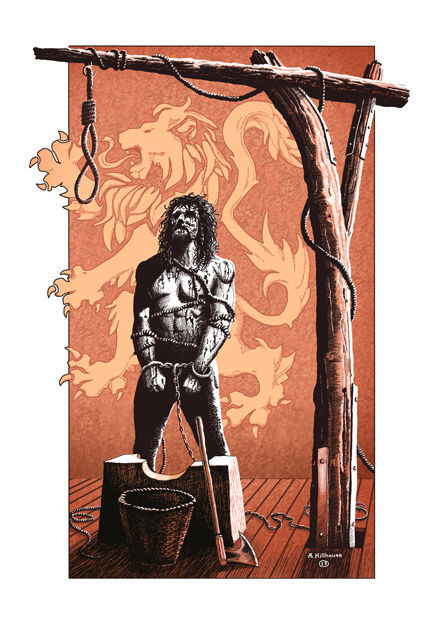
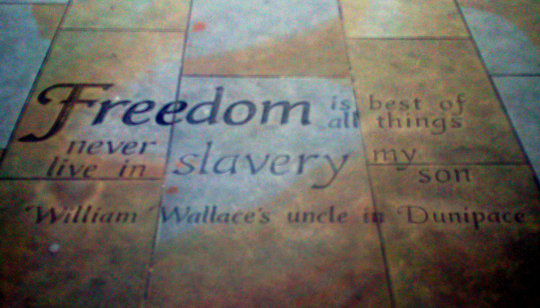


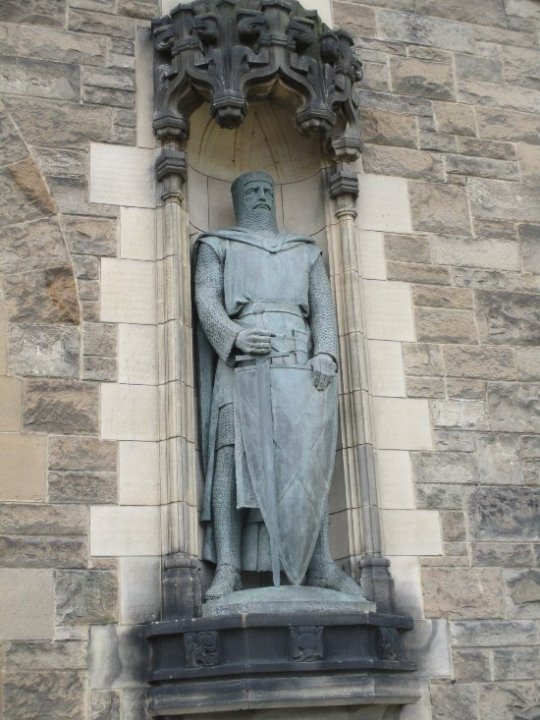
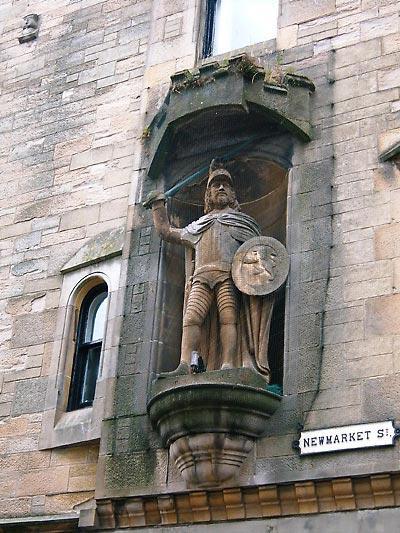
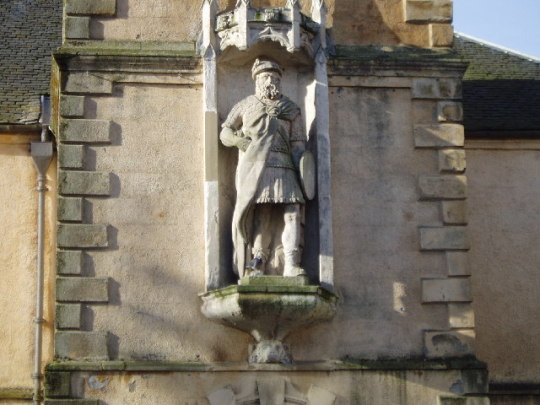




23rd August 1305 saw the trial and execution in London of Sir William Wallace, one time Guardian of Scotland.
I posted yesterday stating the trial happened then, it came u in a source I was reading about Wallace, sometimes the historians can get it wrong, but the post yesterday served as more of prelude and a taster of todays more detailed one.
Wallace is said to have accepted his execution without resistance and a brave heart. He even made a final confession to a priest and read from the book of Psalms before his punishment.
Types of execution at The Elms ranged from burning at the stake (for heretics) to the tried and tested hanged-drawn-and-quartered method for those convicted of high treason. For those unfamiliar with this method, it involves being dragged by a horse to the place of execution, hanged until almost dead, then disembowelled whilst still conscious, beheaded, and finally being chopped into four pieces (i.e. ‘quartered) and subsequently having these pieces put on display across the city, or in Sir William Wallace’s case, the country.
I think it only right to give a background post about Sir William Wallace so hang on to your hats, there’ll be no mention of French Princess’s, Blue painted Australians or the like.
Much of what we know about Wallace comes from Blind Harry, also known as Harry, Hary or Henry the Minstrel, is renowned as the author of The Actes and Deidis of the Illustre and Vallyeant Campioun Schir William Wallace, more commonly known as The Wallace. The trouble is how reliable can Blind Harry’s account be, it was written over 150 years after Wallace's grisly demise, the stories about oor erstwhile hero would have been handed down through word of mouth, possibly even in song.
Harty claims that Wallace's father was named Malcolm, and on this basis Wallace has traditionally been identified as Sir Malcolm Wallace, a minor landowner from Renfrewshire. Sir Malcolm was a descendant of Richard Wallace, a native of the lordship of Oswestry on the Welsh border, (Wallace itself meaning Welshman), who first came to Scotland in the twelfth-century in the service of Walter Fitz Alan, first High Steward of Scotland. This Stewart connection has also been used by historians to explain Wallace's place in the 'patriotic' struggle of the 1290s.
But Harry’s story has some flaws, now I’m not decrying the story, just some details like his age.
No reliable evidence exists to gives us an estimate of his age. Harry claims that Wallace was 'forty and five [years] of age' when he was executed, but also states that he was 'bot eighteen yer auld' shortly before the Battle of Stirling Bridge, which would place the year of his birth around 1278/9.
It shows how difficult it is to build a picture of Sir William.
The contemporary English chronicler William Rishanger implies that Wallace was a young man when he emerged as the leader of armed resistance to the English in southern Scotland in 1297, but this does little to narrow things down. According to Hary, Wallace was raised by his two uncles - both clerics - who saw to his education after his father was killed by an English knight named Fenwick
One of his uncles was from Dunipace, a wee town not far from my home in Falkirk, it is through this uncle we get an oft quoted phrase “This is the truth I tell you: of all things freedom’s most fine. Never submit to live, my son, in the bonds of slavery entwined.” The second pic shows part of the quote, it is on a paving stone on Falkirk High Street that I often walk past.
He does seem to have had two brothers, Malcolm - who would provide Wallace with much-needed support in the later part of his career - and John - who would later be executed for supporting Robert Bruce after 1306. His activities before 1297 are also uncertain, but they may have been less than wholesome. Contemporary English accounts describe him as a 'brigand' and a 'thief', suggesting he may have lived outside the law even before the English invaded. Of course, these may simply be attempts by hostile writers to blacken his reputation. However, a legal document of August 1296 mentions 'a thief, one William le Waleys' as an accomplice of a cleric named Matthew of York who had in June of that year been convicted of robbery at Perth. This could well be our William.
Again I am not trying to blacken his character, I am merely pointing out the difficult job that historians have when piecing together his life.
Whatever the details of his early life, following the English invasion of 1296 that Wallace first emerged into the mainstream of Scottish affairs in a big way. The death of King Alexander III in 1286, followed by the death of his granddaughter Margaret of Norway in 1290, had provoked a major succession crisis in Scotland. Efforts to settle the ongoing dispute between the competing Balliol and Bruce factions had led to increasing English interference in the governance of Scotland, culminating in a full-scale invasion of the kingdom in 1296. I’ve covered all this in posts regarding King John Balliol, the sacking of Berwick and the first Battle of Dunbar all in 1296.
One of Wallace’s first encounters with the English is told in typically dramatic form by Blind Harry, the story goes that William was fishing when he is accosted by five soldiers in the service of 'lorde Persye' Henry Percy, 1st Baron Percy who was the warden of Galloway and Ayrshire . The honest, unsuspecting Wallace offers them some of his fish so long as they leave the rest for his uncle - 'ane agyt knycht' - Wallace hopes to feed, but the soldiers demand all of his fish and attack him when he refuses them. Remarkably, Wallace disarms the first attacker using only a 'poutstaff' ('fishing pole'), seizes the discarded sword, kills two of the soldiers, severs the hand of another, and chases the survivors off!
The earliest confirmed encounter between Wallace and the English administration occurred in May 1297, when Wallace and a small band of supporters killed William Heselrig, the English sheriff of Lanark, shortly before an assize was due to be held in the town. According to the indictment against him in 1305, Wallace and his men also dismembered Helelrig's corpse. Famously, Hary claims that Wallace's attack on Heselrig was in retribution for the killing of Wallace's wife - Marion Braidfute, as Harry identifies her.
It is apparent from contemporary English accounts of the incident at Lanark that it proved to be a powerful recruiting tool for Wallace's rebellion. As Walter Guisborough put it, 'the common folk of the land followed him as their leader and ruler; the retainers of the great lords adhered to him; and even though the lords themselves were present with the English king in body, at heart they were on the opposite side'.
What I find remarkable is that the killing of the soldiers and then Heselrig kickstarted, the uprising against Edwards army and around 4 months Wallace and Andrew de Moray had assembled a combined army of over 6 thousand troops that ambushed the English as they crossed the Forth at Stirling.
Before Stirling we also had the capitulation of the Nobility at Irvine, I have also covered this in a previous post.
In the wake of the Scottish victory at Stirling Bridge, the English administration in Scotland all but collapsed. The Scots were once again able to form a government of their own, and at its head - now as Guardians of Scotland - were Wallace and Murray, although Murray's tenure was cut short when he died - probably of wounds sustained at Stirling Bridge - in November.
This was the zenith of Wallace's career. He had emerged from obscurity to the very summit of Scottish society, all in the space of a year. It also meant he had a price on his head and was the most wanted man in Scotland.
Edward I returned from the Continent in March 1298 and set his sights on Scotland, he marched with an army North in late June and quickly discovered that Wallace's response to the threat had been to devastate southern Scotland and withdraw with his army out of reach of the English. A bitter and frustrating campaign followed, with Edward almost abandoning the chase altogether. However, in late July Edward got wind that the Scots had been sighted near Falkirk, and hurriedly moved his army to meet them.
Precisely why the confrontation at Falkirk happened is, as with so much of Wallace's career, uncertain. Until this point in the campaign Wallace had carefully avoided the English army, a prudent strategy that would later pay off for the Scots under Bruce. Guisborough claims that Wallace had learned that Edward planned to withdraw and hoped to attack the English in the rear. This would at least explain why Wallace so suddenly abandoned his previously cautious strategy. However, given the potential challenges he was facing from the nobility of Scotland it may equally have been the case that Wallace felt compelled to face the English in open battle sooner or later and prove that his success at Stirling Bridge - which was after all arguably at least as much Murray's as it was Wallace's - was not just a lucky accident.
Whatever the case, the battle that followed was an utter catastrophe for the guardian. Abandoned by the cavalry, who may have lost their nerve as they had at Irvine or - as claimed by subsequent Scottish chroniclers - betrayed Wallace, Wallace's schiltrons - tightly-packed bodies of infantry armed with long spearmen - repelled the English cavalry but fell prey to English archery, which broke up their formations and left them vulnerable to a renewed assault by the cavalry. Wallace escaped the battle with his life, but his position as guardian had been irrevocably damaged. It is not entirely clear precisely when or where he resigned the guardianship, but by the end of 1298 Robert Bruce, earl of Carrick (the future king), and John Comyn, lord of Badenoch, were jointly exercising the office of guardian.
Wallace's time as guardian may have been decisively ended, but he remained an active opponent of the English in Scotland. The resistance he offered to the English in this period was not always in keeping with the wishes of the guardians. For instance, in August 1299 an altercation took place at a council at Peebles at which Wallace's plan to travel to France was condemned by Sir David Graham as being 'without the leave or approval of the Guardians'. Wallace's plans were defended by his brother Malcolm, who argued that they were at least 'for the good of the kingdom'
Wallace did indeed leave for France in 1299, apparently on a diplomatic mission to seek the support of King Philip IV against Edward I. Wallace's reception in France was initially hostile, since at the time Philip was himself seeking peaceful relations with Edward I, and Wallace was briefly incarcerated by the French king. However, in November 1300 Philip was writing to his envoys to the pope asking them to promote Wallace's case at the papal court. It is possible that Wallace himself visited to Rome assist in making the Scottish case to the pope in person, and the fact that when he was eventually he reportedly had on his person a safe-conduct from King Hakon V of Norway may suggest he also travelled to Norway on diplomatic business (although he may simply have planned to do so at some point). By 1303 - possibly earlier - he was back in Scotland and again involved in armed resistance to the English
By this point the tide in the war was slowly turning against the Scots. The French were once again pursuing a peaceful policy towards the English following their own military reversal at Courtrai in 1302. Scottish nobles were gradually making their peace with the English, and the surrender of Stirling Castle marked the effective end to organised Scottish resistance on a large scale. In light of his increasing success, Edward I was generally willing to be fairly accommodating towards those Scots who were willing to submit to him, but this was not so with Wallace. Indeed, in the general amnesty offered to the Scots by the English, Wallace might at best 'render himself up to the will and mercy of our sovereign lord the king, if it shall seem good to him' - hardly an encouraging prospect. When Wallace's long-standing cohort Simon Fraser submitted to Edward in July 1304, he was welcomed into the king's peace only on the understanding that he would assist in the ever-intensifying hunt for the fugitive Wallace. Nevertheless, Wallace remained at large until 3rd August 1305, when he was seized near Glasgow by men in the service of Sir John Menteith, keeper of Dumbarton Castle on behalf of King Edward. Menteith - identified as Wallace's 'gossop' ('godfather') by Harry.
Having finally captured Wallace, Edward I refused even to see him. Instead, Wallace was taken to London for what for want of a better word might be called a trial.
Sir Peter Malory, one of the king's justices, presided over the proceedings, which were little more than a formality. The charges were considerable. Wallace had, according his accusers, been a traitor to King Edward, perpetrated armed resistance against him and slain the king's officers (William Heselrig was mentioned by name), assumed the authority of 'a superior' of Scotland, submitted 'to the fealty and lordship of the lord king of France and [gave] him help to the destruction of the kingdom of England', made war on the northern counties of England, 'feloniously and seditiously assaulted, burned and devastated religious men and nuns...[and] inflicted [upon] all, old and young, wives and widows, children and babes the worst death which he could devise', and 'harmoniously and eagerly...refused to submit himself to the lord king's peace' even after being defeated at Falkirk. According to the Annals of London, he 'answered that he had never been a traitor to the king of England, but granted the other crimes charged against him'.
In the eyes of the English as an outlaw, Wallace had no recourse to a defence. Instead, he was summarily sentenced to be executed in the manner reserved for traitors. Wallace was thus 'dispolyeid of his weid' as Hary puts it and dragged naked on a hurdle through the streets of London. At Smithfield he was hanged by the neck 'for the robberies, homicides and felonies which he carried out in the kingdom of England and the land of Scotland'
Before he could suffocate he was taken down and emasculated and disembowelled 'for the dreadful wickedness which he did to the church'. His 'heart, liver and lungs and all the bowels...from which such perverse thoughts proceeded' were then burned. Presumably now dead, Wallace was beheaded - the punishment for outlawry - and his body was divided into four parts. His head was to be displayed on London Bridge (where it remained until at least September the following year, when it was joined by that of his former comrade Simon Fraser). The remaining quarters were to be displayed on gibbets at Newcastle-upon-Tyne, Berwick-upon-Tweed, Stirling and Perth, 'to put dread in and to warn all by-passers and observers'.
The savagery with which Wallace was dispatched contrasts sharply with Edward I's attitude toward the Scots in general, but let’s not forget it was the usual punishment for any person deemed to be a traitor.
However it appeared that Longshanks earlier experiences with the Scots had convinced the ageing English king that a more conciliatory approach to establishing a lasting English administration in the kingdom. Edward's new plan for the settlement of Scotland envisaged a ruling council composed primarily of Scots - including the likes of Bruce and Comyn - which would advise an English lieutenant who would retain overall authority. Scots law and custom was to be respected, at least in the short term, and it may have seemed to many at the time that the objections that had fuelled Wallace's original rebellion in 1297 had been addressed.
As we know, the matter would be rendered moot less than six months after Wallace's death when Robert Bruce killed Comyn, forcing him to make public his ambition to become King of Scots. In many senses Bruce's struggle was quite unlike Wallace's, being primarily motivated by his own ambitions and perception of his rights. That being said, if Wallace had not maintained the momentum behind Scottish resistance to the English, particularly in the crucial year of 1297, then Bruce may never have had his opportunity to make his successful bid for power.
Pics are statues of Sir William Wallace around Scotland in order, Bemersyde near Dryburgh, Aberdeen, opposite His Majesty's Theatre, Edinburgh Castle, Newmarket Street Ayr, St Nicholas Church, Lanark, Stirling Town Centre, The National Wallace Monument Abbey Craig, Stirling, showing it before and after it’s recent restoration, Scottish National Portrait Gallery, Edinburgh and his memorial at Smithfield, London. There are others around the world that remember the Scots Patriot who so bravely stood up to fight for his country.
83 notes
·
View notes
Text
t-shirt
Day 8, Story #1 is by @accio-broom
Title: t-shirt
Author/Artist: accio-broom
Pairing: Ron Weasley / Hermione Granger
Prompt: Cuddling
Rating: T
Trigger Warning(s) (if any): None
In the morning when you wake up, I like to believe you are thinking of me
And when the sun comes through your window, I like to believe you’ve been dreaming of me.
Hermione Granger isn’t the kind of girl who struggles to get out of bed, especially when there are pressing Head Girl duties to attend to. Her to-do list is as long as her arm, she has five essays to write and a whole raft of other bits and bobs she needs to see to.
But right now, with the sun peeking through the edges of the heavy curtains surrounding her four-poster bed, she wants to bask in the aftermath of her dream just a little longer. Even as her dorm mates start to clatter around the room, getting ready for the day, she snuggles deeper under her duvet and shuts her eyes, trying her best to get back to her own little world.
Is Ron doing exactly the same thing right now? He loves his bed, and always complains when she forces him out of it earlier than he wants. Is he having the same lovely dreams as her? Probably not, he’s been away on an extremely secretive training mission for the past five days, and he isn’t a fan of sleeping on the floor. Still, she likes to think that even the memory of her has been keeping him warm at night, even if he isn’t comfortable wherever he is.
Dreaming.
Her dreams last night were amazing.
They were in the Gryffindor common room, sprawled across the comfiest sofa next to the fire. He’d untucked her blouse, and one of his hands was under the white material, massaging her bra-clad breasts whilst he buried the other somewhere underneath her school skirt. He was only wearing his plaid pyjama bottoms, which were doing nothing to hide his growing excitement, and the faded orange Cannon’s t-shirt he often wore to sleep.
She loves that top. It’s threadbare and far too small for him, accentuating his muscles, and exposing patches of his skin. She likes to wind her fingers through the holes, count the freckles she can see as they explore each other’s bodies. Dream Hermione couldn’t get enough of Ron’s skin; she licked and sucked at his neck while her hips lifted to press against his, grounding into his erection and causing the delightful friction she can never get enough of.
Despite their public position, there had been no panicking about being caught or interrupted. She was consumed in Ron, and he in her. The most perfect dream.
But it was all a dream. Hermione is still at school and Ron is in the Auror Academy, and they are facing months of separation. If he does well in his mission, he’ll pass his assessments and move on to the next stage. There will be no passionate make-out sessions, heavy petting, or sex anywhere until her Easter holidays at the earliest, and it definitely won’t be happening at school.
I know, ‘cause I’d spend half this morning, thinking about the t-shirt you sleep in
I should know, ‘cause I’d spend all the whole day, listening to your message I’m keeping.
With a heavy huff, she rolls onto her back and reaches under the mattress for the pristine parchment she has hidden there.
Over the years she’s known Ron, she could safely say that he was rubbish at writing to her. Summer breaks and Christmas holidays passed without a single word from him. But their newly fledged relationship, combined with her leaving in September, seemed to inspire a completely different side to the boy. If he was at home, she could now expect Pidwidgeon almost every morning, and each letter the owl delivered was soppier and longer than the last.
It is clear that Ron misses her.
She finds her wand under her pillow and pulls it out, tapping it against the paper before discarding it again. It begins to unfold, revealing a whole pile of messages from her beau, Ron’s familiar unintelligible scrawl decorating every inch of them. If she hadn’t spent the last six years deciphering his essays, she might have struggled to read them, but now she devours every word, the familiarity somewhat easing her home-sickness.
In his first letter he reminds her that she has to keep these letters secret, to hide them safely away from prying eyes. Ron doesn’t want anyone getting their hands on them, a panic magnified by the fact that Hermione is sharing a dorm with Ginny this year.
“Just imagine what they’d say,” Ron writes, and Hermione can picture the tips of his ears turning bright pink as his quill scratches against the parchment. “I don’t want them to take the piss.”
She’d written back, assuring him that his letters were safe and that he shouldn’t be ashamed of his ability to express his feelings. It’s the sign of a mature man.
Plus, she finds the confidence in his words sexy.
Letting her fingers trail over the paper, Hermione allows herself to get lost in the things he tells her. There’s the boring, mundane things, like how work is going and pleading with her not to get riled up over her latest marks (which ended up being perfect, of course). Next, come the promises and their plans for life post-Hogwarts. They want to get a flat together and go on a lovely holiday, where they can be alone for a whole week. Each sentence makes the smile on her face grow even bigger.
She takes her time, savouring how close to Ron they make her feel. She misses him like crazy. When she packed her trunk last September, she couldn’t even imagine how hard being apart from him would be. She’s an independent woman, a war heroine, in fact, but the yearning and pining for the guy drove her mental on occasion. She hates that she’s so reliant on him now.
Still, there are only a few more months left of her school year, and then they’ll be together forever.
The words run out, and Hermione lets out a heavy sigh. She sits up, tapping the paper again with her wand before stowing it safely back in its hiding spot. Feeling ready to face the day, she swings her legs out of bed and throws back her curtains, catching Ginny by surprise.
“Good morning!” Hermione smiles as she springs out of bed.
“Is it?” Ginny complains in return. “It’s snowing, which means no Quidditch.”
Hermione collects her things and heads for the shared bathroom with a chuckle, not letting the thought of bad weather affect her good mood.
⁂
When I saw you, everyone knew, I liked the effect that you had on my eyes
But no one else heard the weight of your words or, felt the effect that they have on my mind.
Today’s Head Girl duties include monitoring the monthly visit to Hogsmeade. As a seventh-year, Hermione is allowed out of the castle anytime she wants, as long as she tells her Head of House. But the younger children always need supervising. Even with the war over, and the threat of Voldemort over, they still need to be cautious.
It’s her favourite part of the month. Being cooped up in the castle is so oppressive after a year spent camping in forests and hiding on cliff tops, so being out in the village helps clear her head.
If she gets five minutes, she may even be able to pick up Ron’s birthday present. There’s still a week until the big day, and chances are, he’ll probably still be away for work, but she wants to collect it now, just in case. She’ll wait until she sees him face to face before she gives it to him.
The late February snow is trying to melt, but the keen Scottish wind keeps the last of it lingering around. Hermione stands in her usual spot outside Honeydukes, watching as the students enter the shop then leave with their arms full of treats. Her parents would have an aneurysm if they saw the number of sugary treats devoured by the children in the school. Just the amount Ron consumes would set them off.
The thought of her boyfriend brings another smile to her lips, though it does nothing to stave off the cold. What she wants right now is to be cuddled up in Ron Weasley’s strong arms, a mug of Molly’s delicious hot chocolate and a roaring fire, and in that particular order, too.
A loud pop distracts her as someone apparates at the bottom of the lane. Over the heads of raucous students, a tall stranger appears, bundled up warm against the cold. She finds her gaze drawn to the newcomer, and she immediately recognises the bounce in his step as he walks past the rows of shops and hordes of students.
Hermione’s heart beats in an unsteady rhythm against her ribcage, her eyes widen, and the air disappears from her lungs. As the man draws closer, she catches a peek of red hair under a bright orange bobble hat and the long, thin nose that so often grazes against hers as they kiss. But what draws her to the man is his deep blue eyes, which she can see shining up the street from a million miles away.
It’s Ron.
With an uncharacteristic squeal, she takes off from her spot, trying her best to keep her balance in the ice as she throws herself at her boyfriend. Arms and legs lock around his long, gangly body with such force he’s almost bowled over. He compensates with long fingers clinging on to her as she buries her head against the crock of his neck. Her senses ignite as she takes a long breath, drinking in the smell of him—clean, with a hint of sandalwood and eucalyptus.
“What are you doing here?” she mumbles against his skin, her lips finding a path between his knitted scarf and stubble up his pale neck.
Ron moans at the assault from her kisses. “Missed you, is all.”
Hermione Granger has always been an intelligent girl, so it’s a surprise to her that a handful of words can turn her mind to mush. Right now, despite the fact she’s supposed to be on Head Girl duty, all she can focus on is the handsome man in her arms, and the fire blazes through her skin at their contact, even through layers of clothes.
Falling.
Forgetting that they’re in a public place, Hermione’s mouth seeks his, and they fall into a hungry kiss. Teeth clash, noses bump together, yet after weeks away, it’s the best thing in the world. The taste of peppermint and chocolate frogs spreads across her tongue, taking her straight back to lazy summer days spent snogging out by the lake at the Burrow.
Just as her lungs feel like they might explode, Ron tears his lips away from hers, and he flashes her one of his patented lop-sided grins. If she didn’t have her legs firmly wrapped around him, she might have gone weak at the knees.
With a chuckle, he teases, “Guess you missed me too?” All Hermione can do is nod in reply, overwhelmed by his sudden appearance. “Good! I missed you so fucking much. My mission finished early, but Harry is still away, and I didn’t know what else I could do to distract me from worrying about the results.”
“Oh, glad to see I’m your second option,” Hermione chides, although her massive smile does not falter. “How did you know I was here?”
“Ginny has been sending me your Head Girl schedule for months. Not that I’m keeping tabs on you,” he adds. “Just wanted to make the most of any opportunity I might have to see you.”
Impressed by his cunning plan, she presses one final hard kiss against his lips before removing herself from their reunion embrace. “Well, since it’s your birthday in a week, I guess I better start spoiling you.”
She tangles their fingers together before starting to lead him down the lane.
“But what about your duties?” he questions. “I didn’t think your slot finished until lunchtime?”
“It doesn’t, but I don’t think it will matter if I skive off a little earlier. Especially given the circumstances.”
With her back turned, she misses the look of glee that passes over Ron’s face before his eyes turn dark. She’s too absorbed in her mission to buy him all his favourite treats, cavities be damned, then curl up in a cosy corner by the fire in the Three Broomsticks so that she can do some serious catching up with him.
Their palms press together as they walk, filling her body with warmth. Ron is back where he belongs, and even if it’s only for a few hours, this feeling is a hundred times better than any of the letters he sends while they’re apart.
I know, ‘cause I’d spend half this morning, thinking about the t-shirt you sleep in,
I should know, ‘cause I’d spend all the whole day, listening to your message I’m keeping,
Not that she plans on ever getting rid of them.
and never deleting.
#chudleycanonficfest2021#HP fest#hp canon pairings#canon fest romantic#submission#romione#ron x hermione
111 notes
·
View notes
Text
Religious Medievalism: “Stregheria”, Wicca and History - part 1
[TN: This article will break the Introduction to Stregoneria series for a second, but I believe it’s important to set things into perspective about both Witchcraft and this blog.
My goal is to put out content, translated or redacted by me, in order to give people the correct historical information. I see a lot people on TikTok messing with things they don’t know, appropriating and distorting practices and cultures and profiting off of it.
The only focus of this blog is the practice and the history behind it, I don’t want to “put people down”, I want to make the information available so you won’t hurt yourselves.
Also, I do not support fa***sm, na**sm or any other movement/ideology that oppresses and discriminates people. I’m specifiying this because I’ve received an anonymous ask about it and it kind of hurt just reading it. I hope this will clarify things and make whoever asked me that more confortable with my blog and my content. I’m a history nerd Strega, nothing more.
This article will be a translation, synthesis and re-elaboration of the following articles
https://tradizioneitaliana.wordpress.com/2020/11/12/medievalismo-religioso-stregheria-wicca-e-storia/
https://medievaleggiando.it/la-legittimazione-storica-della-wicca-margaret-murray-e-la-manipolazione-delle-fonti/
https://medievaleggiando.it/il-vangelo-delle-streghe-e-linizio-della-wicca-il-fascino-di-un-falso-storico/
The first being a rectification of the two that follow.
This article will be divided in two parts because it’s way too long to read and to translate, i’m drained af]
THE DEBUNKING OF MURRAY
Margaret Alice Murray (1863-1963) was a British Anthropologist and Egyptologist, well known in the academic environment for her contributions in the studies of folklore. Even if she was very criticized and her reputation as an historian was poor, her work became popular bestsellers from 1940 onward.
The most well-known and controversial one is “The Witch-Cult in the Western Europe” published in 1921.
In this book, Murray alleges that there was some sort of secret model of pagan resistance to Christianity spreaded all across Europe, and that the witches’ hunt and the proof presented to the trials were an attempt to eliminate a rival cult.
This book was clearly influenced by “Satanism and Witchcraft” by Jules Michelet, that alleged that Medieval Witchcraft was an act of popular rebellion against the oppression of feudalism and the Roman Catholic church, that took the form of a secret religion inspired by paganism and organized mainly by women.
To support her narrative, Murray chooses to analyze some of the trials that took place during the great hunt and employs 15 primary sources, mostly British or Scottish (not paneuropean, or sources from the european continent), that describe famous trials.
Murray’s analysis of the Somerset Trials in 1664 offer a good example of her work ethics; quoting the testimony of Elizabeth Styles:
“At their meeting they have usually Wine or good Beer, Cakes, Meat or the like. They eat and drink really when they meet in their bodies, dance also and have Musick. The Man in black sits at the higher end, and Anne Bishop usually next him. He useth some words before meat, and none after, his voice is audible, but very low.”
Murray conveniently seems to “forget” to quote the immediately preceding phrase:
”That at every meeting before the Spirit vanisheth away, he appoints the next meeting place and time, and at his departure there is a foul smell.”
Other details offered by Styles are omitted, like when she alleges that the Devil presented to her in the shape of a dog or a cat or a fly, that the Devil offered her followers an oinment to use on their heads and wrists that made it possible to move them from a place to another. Or that sometimes the reunion involved only the spirits of the witches, while their bodies stayed at home.
Murray was fully aware of the fantasy element in the testimonies she included in her books, but she was able, by deliberately manipulating historical sources, to make people believe the fake narrative that a Medieval religion of witches with covens, rites and their own beliefs that relentlessy opposed Christianity really existed.
In her “The God of the Witches”, published in 1933 and clearly written for a commercial audience, she further broadened the scope of her claims on the witches’ cult.
In this book, she alleges that until the C17th BCE the there was a religion, older than Christianity, that kept existing in all of Western Europe. Said religion, was focused on the worship of a two-faced horned god, known to the Romans ad Diano; this god presided the witches’ gathering and was mistaken by the Inquisition of the Devil, conclusion that made them associate witchcraft with a satanic cult.
Murray claims the existence of a *specific* non-christian organized cult spread all across Europe that worshipped Diano and relentlessly opposed the Roman Catholic church, but the sources she quotes are late and recount the flattening of the various “pagan” cults to the assimilation with the christian Devil, operated by the Church.
In fact, the Devil that the trials report on, depending on the religion, overlapped with different figures: in British and Scottish traditions the Devil was the result of the demonization of the King of Elphame.
In the Basque country, the Devil substituted Mari. In Northern Italy it overlapped with the Donna del Buon Gioco.
This means that the “Northern Italian Devil” is different from the “British Devil” and the “Basque Devil”.
This “Devil” is a figure that flattens everything and overlapped and substituted so many different figures, depending on the religion and the figure it ended up overlapping with.
Therefore, Murray’s narrative of a paneuropean cult of the Horned God stems from the analysis of late sources and to the false equivalence of the Devil that presided the Ludus (Sabba) in Scotland (where he masks the King of Elphame) and the Devil of other countries (where he masks other entities).
Since the Devil isn’t the same entity in all of Europe, the narrative of a counter-christianity organized paneuropean cult of prehistoric origin falls too. Instead, what we’re dealing with are Medieval, non-christian rielaborations of different remainders of the Religions of the Gentiles that survived in the Christian age and were absorbed in the legend of the Faery Procession/Procession of the Dominae Nocturnae first, and the legend of the Ludus (Sabba) later.
The following quote by Ronald Hutton, English historian who specialises in Early Modern Britain, British folklore, pre-Christian religion and Contemporary Paganism and professor at the University of Bristol, confirms this:
“Over a quarter of a century ago, I adopted the expression “Pagan survivals” to describe elements of ancient Pagan culture that had persisted in later Christian societies. In doing so, I was drawing a distinction between such survivals, of which there seemed to be many, and “surviving Paganism”; that is the continued self-conscious practice of the older religions, of which there seemed to be none. This point was worth making because even in the 1980s, there was a persisting belief, based on outdated academic texts, that Paganism had survived as a living force among the common people in much of medieval Europe: it was widespread in other scholarly disciplines than history, let alone among the general public. My formula and approach was adopted by other authors in the 1990s. During that decade, however, a reaction set in against it among historians who preferred to stress the comprehensive Christianization of medieval European societies and to relegate elements that had hither to been identifed as of pagan origin to categories of religiously neutral folklore or of lay Christianity. Some emphasized that the undoubted tendency of some Christians at the time to condemn such beliefs and practices as pagan was a hallmark of a highly atypical, reforming, intolerant and evangelical strain of churchman. Michael’s system of classification, in this volume, may be said to take its place in this, apparently now dominant, set of scholarly attitudes. Revisiting the issue myself, I am inclined to meet it halfway. I am startingto agree that to speak of aspects of medieval culture as “Pagan” might indeed be misleading and inadequate. Moreover, it would be especially inappropriate to characterize fgures such as the lady of the night rides, the fairy queen or the Cailleach as “Pagan survivals” when they seem like medieval or post-medieval creations. However, I have equal diffculty in describing them simply and straightforwardly as “Christian” because of their total lack of reference to any aspect of Christianity, including theology, cosmology, scripture and liturgy; all of them would indeed fit far more comfortably into a Pagan world-picture. […] It may be that the old polarized labels are becoming inadequate to describe a medieval and early modern religious and quasi-religious world that is coming to seem even more complex, exciting and interesting than it had seemed to be before.”
Also Michael Ostling, religious studies scholar focusing on the history, historiography, and representation of witches and witchcraft, confirms this in Fairies, Demons, and Nature Spirits: “Small Gods” at the Margin of Christendom, published in 2018.
“Christians encompass aspects of their prior paganism both by inversion and revaluation. But where traditional spirits remain salient to a Christianized culture in encompassed or inverted form, their ongoing reality ought not to be counted by scholars as a pagan survival—though it is likely to be so construed by Christians themselves. Such “surviving” spirits are not just marginalized or diabolized pagan remnants, they are continually re-performed, recreated through Christian ritual and Christian discourse. We find such re-creation of the small gods throughout Christian history, and throughout this volume: when the Urapmin drive out the motobil by the power of the Holy Spirit, when Andean people frame their propitiation of the yawlu with devotion to the Christian God, when Mami Water appears primarily as a trope of Pentecostal deliverance ministry, when thirteenth-century Frenchwomen see, in an unoffcial Christian saint, their best hope of negotiating the return of their stolen babies from the follets, when the brownie and Robin Goodfellow appear in prayers of protection against them, in assertions of their diabolical status, or in tolerant mention of superstitious old wives who stillbelieve in such “harmless devils,” when cunningwomen insist that they only use “good devils” or that the fairies who facilitate their divination have no fear of the cross, this is because the beings involved have succeeded in taking up a niche within Christian discourse. The “good people” have not departed, have not been driven out by the sound of church-bells or the smell of gasoline. There are no pagan survivals: small gods are Christian creations with which to think the limits of Christianity.”
In essence, Murray’s version of events that describes Paganism as an anti-church, anti-society isn’t backed by any historical evidence.
Sources:
https://tradizioneitaliana.wordpress.com/2020/11/12/medievalismo-religioso-stregheria-wicca-e-storia/
https://medievaleggiando.it/la-legittimazione-storica-della-wicca-margaret-murray-e-la-manipolazione-delle-fonti/
https://medievaleggiando.it/il-vangelo-delle-streghe-e-linizio-della-wicca-il-fascino-di-un-falso-storico/
Michael Ostling. Fairies, Demons, and Nature Spirits: ‘Small Gods’ at the Margins of Christendom. Palgrave Macmillan, 2018.
#witchcraft#wicca#reconstructionist traditional witchcraft#traditional witchcraft#stregoneria#stregheria#witch#medieval witchcraft#spirits#familiar#familiars#pantheon#italian witchcraft#sabba#sabbat#strega#streghe
138 notes
·
View notes
Text
“Antifeminist jest and satire against alewives, shrews, and gossip soften grouped together as gossips' literature-provides a rich site for this sort of excavation. The word gossip itself requires more careful treatment than it is usually given. Respectable for centuries, gossip (from godsip) referred primarily to a godparent of either gender. By the sixteenth century the word was being applied to any close female friend, though it was sometimes used for male friends as well. In the late sixteenth century "gossiping" described a "merry meeting" of women to drink, laugh, and talk; it was not until a century later that Johnson's Dictionary equated gossip with the obnoxious woman "who runs about tattling like women at a lying in." Early modern speakers drew important distinctions between scold and gossip. The words were by no means equivalents.
Unlike talking about one's neighbors, scolding was a chronic, legally actionable offense; and the connotations of shrew varied from mild to damning. In Brathwait's Essaies upon the five senses (1619), a scold "goes weekly a catter-wauling, where shee spoiles their spice-cup'd gossiping with her tart-tongued calletting." Whatever those gossips are up to, the scold is wrong to spoil it. Such a distinction suggests that women had certain rights of assembly-despite all the injunctions that women should stay indoors, avoid all gadding, and strive for silence. Traveler Emmanuel Van Meteren marveled that Englishwomen spent so much time visiting their friends and keeping company, conversing with their equals (whom they term gossips) and their neighbours, and making merry with them at child-births, christenings, churchings and funerals; and all this with the permission and knowledge of their husbands, as such was the custom.
Daniel Rogers warned husbands that they would be foolish to forbid their wives to attend gossipings and even advised them to give wives money "to bestow upon the meetings and lawfull merriments of their kind, which it were a poore thing for a husband curiously to enquire after." Robert Cawdrey urged moderation rather than abstinence: gossips should meet only as often as "the law of good neighbourhood doth require." John Stephens's character "A Gossip" predictably conflates a woman's volubility and mobility with sexual and bodily incontinence.
Her knowledge is her speech; the motive, her tongue; and the reason is her tongue also: but the subject of her eloquence is her neighbours wife, and her husband, or the neighbours wife and husband both. Shee is the mirth of marriages, and publicke meetings .... Shee carries her bladder in her braine, that is full; her braine in her tongues end, that shee empties .... Shee emulates a Lawyer in riding the circuite, and therefore she keeps a circuit in, or out of her own liberties: striving to be both one of the judges, Jury, and false witnesses: that is her freedom only, to censure .... Her truth is, to make truths and tales convertibles: tales be her substance, her conceit, her vengeance, reconcilements, and discourse .... If she railes against whoredom it savours not of devotion; for she is only married to escape the like scandall; from the doore outward.
The irony, of course, is that the author rails in the catty tones of a censorious neighbor. Despite the formulaic hostility in this character, one may glimpse a shadow portrait of a neighbor and a neighborhood. Like neighbor, the term gossip implies a relationship between peers. Always on hand for disputes and interventions, she also serves as a chief relayer of news and knowledge within the community. As the sarcastic phrase "one of the judges" indicates, she operates as an informal social arbiter. Ironically, it is precisely her narrative skill that qualifies her for this role. No matter how caustically "tittle tattle" was scorned, gossip "gave women a particular standing in neighbourhood social relations," as Gowing puts it. "Telling stories and judging morals made women the brokers of moral reputation."
While Stephens derides his gossip for gadding and tattling, he fails to suppress an uncomfortable social fact: such women can never be excluded from the crucial labor of maintaining social order. Pamphleteers and playwrights devoted much energy to trivializing women's talk at gossipings, betraying their fear that the effects on men's reputations could be far from trivial. In a merry meeting in Thomas Deloney's Thomas of Reading, some gossips "talkt of their husbands' frowardnes, some shewed their maids sluttishnes, othersome deciphered the costliness of their garments, some told many tales of their neighbors." Some jest gossips are two-faced, greedy, and leaky, such as those in Middleton's Chaste Maid in Cheapside. Others are almost witchlike.
The author of The Gossips Greeting (1620) rants against "the proud, peevish, paultry, pernicious shee-pot companions, those curious, careless, crafty, carping curtizanicall Gossips ... dangerous as hell, / None of you beare a modest womans mind / You do infect even with your smell." These representations must be read alongside gossips' texts that are more nuanced and altogether less bilious. Samuel Rowlands's best-selling Tis Merry When Gossips Meet (1602) and A Whole Crew of Kind Gossips (1609) painted alehouse meetings with a mix of humorous voyeurism, mild satire, and unusually candid social realism. In the first pamphlet a wife and widow give a maid fairly standard advice about men and marriage. The widow buys them rounds with an evident pride in her ability to pay, providing a strong contrast to the many jests in which drunken men cheat the hostess.
Satire is directed largely at the widow, who gets tipsy and garrulous. But for the most part, the pamphlet leaves the impression that it offered readers a glimpse of women indulging in a merry pastime that formed an important and familiar part of neighborhood socializing. To repeat Wrightson's argument, the ideal of "good neighborhood" required everyone to accept neighbors "as a reference group in matters of behavior and to promote harmonious relations among them." How could a woman fulfill this obligation without asking, "What news?" The surprising answer is that she couldn't. What we now call gossip was, in fact, essential to being a good neighbor, and talking about neighbors and strangers was not considered the prelude to scolding or near kin to slander. The obligation of neighborhood made constant comment not only normative but a prime regulating device.
To use Merry Wives as an example, the Windsor wives' censure of Falstaff and gossip about Ford initiates action that will eventually involve their neighbors in neutralizing the threats to the common peace posed by a sexual adventurer and a horn-mad husband. Their joint consultation and campaign of mockery lie firmly in the bounds of "good neighborhood." Censorious gossip "could be an effective informal method of control: it indicated community disapproval, and shamed its subject. If the subject of gossip did not stop the behavior, at least everyone else knew what to think about it." Gossip, defined this way, could maintain and reiterate social boundaries. Fueled by curiosity and pleasure in ridicule, gossip also primed audiences to recognize the more cutting forms of wit and the aesthetically engineered moral judgment known as satire.
Proficiency at this narrative form, so often salted with jests and proverbs, promoted rhetorical efficacy in life and art, while skill at telling believable stories about one's life and neighbors held much weight in the courtroom and on the streets. Gossip was not always conservative in effect. By asking "What news?" women also had a chance to learn about and talk over events in the larger world, out of the hearing of husbands, fathers, and masters. According to historian Steve Hindle, gossip is both a "female subculture" and a "formative stage in the development of 'public opinion' over a whole range of issues, local and national, private and public, personal and political. To ignore gossip is to ignore one of the few channels of participation in this 'public sphere' that was open to women."
Gatherings during working time or in leisure moments, such as christenings, may have given women a place in which to articulate opinions and to plan for common action, such as the many enclosure protests, grain riots, and religious disputes in which they participated. Some fictional gossips poach eagerly on male discourses supposedly closed to them, such as biblical interpretation, the worth of stage plays, and the fate of kings. In The gospelles of dystaves (c. 1510) a group of women meets secretly to hear a new kind of preaching by "apostles" named Dame Hengtyne and Dame Abunde, while a male scholar transcribes. Their chat mixes homely proverbs and bawdy laughter, interspersed with more serious challenges to religious teachings about women's subjection.
While the pamphlet obviously satirizes ignorant and unruly women, it also suggests that women did talk together about what they heard in church and that they were given to interpreting biblical passages in favor of women's interests. Female association could be dangerous to the state: the weird sisters of Macbeth carp about their neighbors, crack jokes, practice riddling prophecy, and rearrange Scottish history. Like gossips in their cups, they "scorn male power" while "their words and bodies mock rigorous boundaries and make sport of fixed positions. " In The Staple of News, Jonson attempts to silence and discipline unruly women in his audiences by presenting caricatures of neighborhood gossips.
Underlining the close association between the juries of the threshold and the theater, Tattle, Mirth, Censure, and Expectation boldly invade the stage with their stools, sitting down to cavil about the actors and the sweaty playwright, forming a jury of women who judge a play together as if they were judging gossip and scandal at home. Despite the satire, Jonson casts them as the prime producers and consumers of news and rumors; he cannot help but make them sharp-eyed judges of the staple, which commodifies word of mouth" by printing it. Occasionally gossips are painted as resourceful and clever. In Dekker and Webster's Westward Hal, citizen wives furnish themselves "a commodity of laughter" by leading their jealous husbands and eager suitors on a wild-goose chase up the Thames.
As in Merry Wives, this pleasure carries a risk. When they plot to scare their husbands with the prospect of horns and turn the tables on their arrogant suitors, one wife warns the others that they must deflect any resulting slanders using shrewd foresight: tho we are merry, let's not be mad: ... It were better we should laugh at these popin-Jayes, then live in feare of their prating tongues: tho we lie all night out of the Citty, they shall not finde country wenches of us: but since we ha[ve] brought em thus far into a fooles Paradice, leave em int: the Jest shall be a stock to maintain us and our pewfellowes in laughing at christning, cryings out, and upsittings the twelvemonth.
Similar scenes of female complicity are rooted in the social reality of women neighbors and gossips who rely heavily on each other's judgment in matters sexual and romantic. Such interdependence was especially important for unmarried women. Comedies featuring maids satirizing suitors (like Portia and Nerissa in The Merchant of Venice) or coolly ranking types of men (like Franck and Clora in Fletcher's The Captain and Celia and Rosalind in As You Like It) probably did stoke masculine anxieties about patriarchy's vulnerability to the desires of women. On the other hand, the very same scenes may have delighted women or taught them sophisticated new ways to squelch unwanted suitors.
The antimasculinist satire and complaint that fill gossips' literature function in a distinctive way in Margaret Cavendish's Convent of Pleasure, which virtually reproduces passages from gossips' literature and from women's tirades in controversy pamphlets. Poor women meet in the street to moan about the flaws of their husbands, which include wife beating, heavy drinking, and gambling away the household funds. Other scenes show the terrors of childbed and the persecution of a gentlewoman threatened with rape by a married man whose proposals she rejects. Neighbors and friends cannot stop rapine suitors or worthless husbands in this dystopia; so Cavendish creates a gender retreat that takes female complaint seriously, dedicating her earthly paradise to women's association, education, and delight: a high-toned gossips' feast.”
- Pamela Allen Brown, “Ale and Female: Gossips as Players, Alehouse as Theater.” in Better a Shrew than a Sheep: Women, Drama, and the Culture of Jest in Early Modern England
17 notes
·
View notes
Text
Indie Book Rec’s
because I’ve been reading like there’s no tomorrow and have found a number of indie/lesser-known authors with books I really love, and because I’ve not yet earned the right to leave reviews on Amazon, I’m taking to Tumblr, I guess.
Idk why any of you followed me but you’re getting book rec’s.
SO. Buckle up. I’ll probably do this every month as I log my reading journal.
Rec’s and descriptions/reviews under the cut because I expect it to get long.
The Bright Spear Trilogy by H. L. Macfarlane
(Prince of Foxes, Lord of Horses, King of Forever)
Gothic Scottish fairytale. Probably YA. Faeries, kelpies, and that one stubborn human girl ready to throw hands. Healthy polyamory. Multiple POVs. Not spicy/smutty.
Synopsis of book 1: Girl meets faerie. Faerie gets turned into fox. Girl’s parents blindside her with surprise fiance, so she decides she’d rather help the faerie than marry a Londoner (she’s Scotch to her core). They go in search of a kelpie. Bonding! Sweet betrayal and sweet betrayal again.
Book 1 is honestly my least favorite of the three (book 2 is the best and I’m still mad about book 3 even though it was good), but that’s just me. I read the whole trilogy in 2-3 days.
Quick reads. Fun. Nothing too serious for too long. Happy endings, but with plot things hanging over our heads. No “love triangle” because we’re smart and can just sort it out with polyamory and respecting each other.
Content warnings: miscarriage and implied dub-con/rape in book 3 is all I can remember.
Bought from ThriftBooks, but also available on Amazon and at B&N
City of Thorns by C. N. Crawford
(Book 1 of the Demon Queen Trials trilogy)
(Honestly cannot tell how popular/well-known this author is but in my mind, they’re newer/lesser-known)
Modern coexistence with demons. Little romance-y, little murder mystery-y. Probably YA. Mildest of the spices. Fake dating.
Synopsis: Girl kidnapped by demon because she looks exactly like his Arch Enemy TM, but once they realize the mix-up she agrees to pretend to be her doppelganger to get information for him about his other enemies. Except her doppelganger is a succubus and she doesn’t have the slightest idea how to act sexy and confident and powerful. Queue sexy demon teaching her to be alluring and shameless.
Another quick read. Very fun. The ending is just like bam-bam-bam. I’m still reeling. Stay tuned for when I buy and read book 2 in Feb.
Content warnings: murder, 1 (one) mild sex scene, some blood and gore, guns?
Bought from Amazon, also available at B&N
Thief of Spring and Queen of Night by Katherine Macdonald
(Hades and Persephone duology)
Hades and Persephone retelling, but faeries (yes, I was skeptical at first, too). YA. Romance. Mildest of the spices. Fun twist on Greek mythology.
I’ll skip the synopsis, because it’s just Hades kidnapping Persephone (for good reason, okay?) and keeping her in the Underworld for part of the year, as is expected from most Hades and Persephone retellings.
The difference is that the ‘gods’ are faeries of the Seelie Court and this Hades is not dark and broody, but young and fun and hopeful, which threw me off at the beginning, but I absolutely fell in love with him. Fantastic. Beautiful. Protect at all costs. Demeter is not the one causing problems in this story, but Zera (Zeus & Hera; she killed him and took the name and his powers).
I gave both of these books 5 stars. I already want to re-read them. If you have any interest in Hades/Persephone and/or faerie romance novels, I highly recommend these.
Content warnings: many mentions of Hades’ traumatic childhood, including verbal and physical abuse and dub-con/rape
Bought on Amazon, not on ThriftBooks or B&N that I can find
In the Shadow of Demeter by Vic Malachai
(stand-alone Hades and Persephone retelling)
Literally the Greek myth of Hades and Persephone, just from Persephone’s POV (mostly).
After all the other Hades and Persephone retellings I’ve read (and I’ve read a lot and will read more), this one was a bit lackluster. I think this is where people should start, before they get into the retellings that stretch the story a bit (re: Neon Gods and Macdonald’s above, etc.). That being said, it was short and still good. Hades has a personality that isn’t dark and broody, and they have a history before he squirrels her away to the underworld. There’s peace at the end.
If you like Greek mythology for Greek mythology, very good. Think Ariadne by Jennifer Saint (and presumably Circe and The Song of Achilles, which are on my shelf and tbr).
Content warnings: none that I can think of
Bought on Amazon, not on ThriftBooks or B&N
Pretty Girls Make Graves by Steffanie Holmes
(Dark Academia quadrilogy)
Dark academia! Crumbling uni, secret societies, murder mystery, intrigue, danger, a hot priest. Bully romance, lots of second-hand embarrassment. Little spicy.
I’ll skip the synopsis and repeat: hot priest. Naked in the first chapter. The rest of it is summed up in the dark romance/dark academia description. Absolutely loved it, cannot wait for the next three books. (Stay tuned for book 2 in Feb).
Content warnings: bullying, murder, priest doing not Godly things, some violence and drinking and the usually stuff rich assholes get up to
Bought on Amazon, also available on ThriftBooks and B&N
Signed up for her newsletter to get extra content, which in this case gave me two chapters from the book from the priest and the good bad boy’s POVs and left me with way more questions than the book itself. Then she sent me one of her other books for free as an e-book and that led to:
The entire Briarwood Witches Pentalogy by Steffanie Holmes
(Earth and Embers, Fire and Fable, Water and Woe, Wind and Whispers, Spirit and Sorrow)
Polyamorous witches (reverse harem, one girl and 5 guys). Troublesome fae. Some surprising twists and turns. Spicyyyyy (but not kinky).
Synopsis: Girl’s adoptive Christian parents killed. Girl finds she has inherited English castle. English castle comes with four hot guys (*eyes emoji*). Surprise! She is witch. They are all witches. And they must stop the Unseelie King, obviously. Also, sex increases her power. Queue lots of sex and lots of trouble and some really amazing guys.
Binged all five in a few days. It’s really one single, long story.
Content warnings: murder, self-harm, attempted suicide, major character death (don’t worry it’s not permanent), literal “burn the witches at the stake” mentality and mob
E-books, but available on Amazon, ThriftBooks, and B&N
#book recs#book recommendations#h l macfarlane#c n crawford#katherine macdonald#vic malachai#steffanie holmes#and this is just the indie stuff#lol
3 notes
·
View notes
Text

Author: Her Scandalous Scot
Series: The Highland Knights, Book #2
Book Length: 275 pages
Release Date: June 12, 2023
Overall Rating: 5/5 Stars
Blog Rating: 5/5 Saltire Flags
This is the second time I read and reviewed this book as this book is a reissue and was originally under the title Highland Awakening. Furthermore Amazon posted my 5 star review back in 2017. Now in this second reissue there are some content changes and again I gave it another 5 star review. My review is similar with some minor changes with my second review for the same book. I hope you enjoy this book as much as I did…..Celtic Barb’s Book Review Blog
London, 1816
This hero of the story is the handsome, strong, braw, highlander, Camden McLeod, a member of the secret Scottish mercenary elite group The Highland Knights. Camden, known as Cam, is a man who likes and is used to having things his own, precise way! The heroine is Lady Esme Hawkins, the introverted, shy, sister spinster of the Duke of Trent , who is one of the most important men in all of England! Another interesting layer to this story is Esme has a secret past that caused a scandal and nearly ruined her and the Trent name. Esme wants to make this up for past mistakes to her brother of such a high status and wants him to trust and believe in her again.
Cam and Esme meet where she is in disguise ldoing research at the most unlikely place a man brothel and he is on assignment for a Viscount at a classy expensive first class brothel where. They both share a very passionate kiss and embrace as they have instant chemistry and attraction with a dash of lust. This is the last place you expect to meet an introverted spinster and sister of a Duke. Cam is curious about this woman, when questioned about her notebook Esme fears the worst! She feels if he caught just a glimpse of her writing it could cause her ruin and scandal which forces her to bolt and take off.
Cam and Esme meet again at a party her brother is throwing and this is where he finds out she is betrothed to Henry which doesn't stop Cam in his pursuit of Esme. He is determined to have her and makes it very direct by his feelings and actions. What makes matters worse is her betrothed Henry is a former schoolmate of Cam's from Elton. On top of this there is murder in the mix as one of the Highland Knights has been murdered and the entire group is targeted for murder as well.
Will there be more deaths among the Highland Knights? Could it be Cam? Will they ever find who is doing the killing and why? Who will Esme choose Henry or Cam? Is someone’s heart possibly going to break? Will Esme get ruined with her reputation destroyed if any of her writing is ever made public? Can this destroy her brother's successful political career? To have these questions answered and more you must read this mesmerizing book to find out!
Jennifer Haymore does it again with another quick paced page turner, in “Her Scandalous Scot ''. Furthermore this includes multi dimensional characters, fast moving conflicts, stunning settings, wicked villains that immediately takes you on the path of hatred, devastation and destruction, plus mystery, murder mayhem and so much more that includes love! All the elements historical romance fans want to read about and so much more! Another swoon worthy book that caused me to lose some hours of sleep, but definitely worth the loss of shut eye! This book is action packed and full of twists and turns, a heart warming riveting adventure from start to finish! Jennifer Haymore is an exquisite master storyteller in my opinion and will leave readers totally delighted! Readers definitely do not want to miss this exceptional read!
Even though it is a re-issue that I have read before, after-all this is my second time reading this story, as it felt like a brand new book to me. Especially since there is new content in it and it has been like seven or eight years since I originally read this Highland Knight series. Readers will be able to read this in series order or as a stand alone book. I always prefer to read in book order myself, which I highly Prefer in recommend. It was a delightful read! This series is a reissue from 2016 and as always this reviewer always follows Amazon’s review guidelines.
The Highland Knights Series
1. The Spinster and Mr. Scot formerly Highland Heat
2. Her Scandalous Scot formerly Highland Awakening
Disclaimer: I received an advance readers copy from the publisher. I voluntarily agreed to do an honest, fair, review and blog. All words, thoughts and ideas are my own.
0 notes
Note
Hi! i really enjoy your daemon au and i-ve gone and watched the new his dark materials series because of it. i love your take on daemons and was wondering if you have nymore headcanons for the other boys? what's luz's daemon? liptons? how do you pick their names? are there any daemons who Re the same sex as their humans? you dont have to rwply if you dont want to i just wanted to tell you i enjoy your world very much!!
Oh, hi! I’m glad you’re watching the new His Dark Materials adaptation! It’s pretty good, huh?
I do have headcanons for not just most of the boys but for the world itself. Though I also call it His Dark Materials!AU alongside daemon!AU it’s actually more the latter than the former. The only things I carried over into this AU from the original world of His Dark Materials are the existence of daemons, the fact that daemons are made of Dust particles, and the existence of witches. The magisterium or any kind of theocracy doesn’t exist. The authority and the angels also do not carry over. Instead, our own religions exist, but there’s just as much emphasis on spiritualism and mysticism as there is on moralism, which I believe would be the natural development of religion in this world where your soul/daemon, the spiritual aspect of you, is literally there for everybody else to see.
All of the boys have small or medium sized daemons, the biggest probably belonging to that of Ron and Tab, who have an Ocelot daemon and a sheepdog daemon respectively. The reason for this being that small or medium sized daemons are easily carried and they, alongside bird or other kinds of flying daemons, are preferred by the airborne. You still gotta jump out of a perfectly good airplane largely undetected. Can’t do that with an elephant daemon.
Ok. This got real long so I’m putting the rest under the cut. tw: mentions of death, trauma, and mutilation.
Some of the younger boys’ daemons haven’t settled. Miller, Hashey, Garcia, and Jackson. Hashey and Garcia’s settle in Hageneu. Miller and Jackson never get the chance.
Shifty’s daemon, Myrtle, is a Capybara. But he doesn’t know that. Every time somebody asked him what his daemon was, he’d shrug, say ‘Don’t rightly know,’ then leave it at that. What can he do? Capybara’s aren’t native to Virginia and he’s never been out of Virginia. Webster was the one to tell him that Myrtle was a Capybara because he’d read about them in a book somewhere that one time. Myrtle was startled by this and said; “I thought I was some kind of dog!” that was one of the few times she ever spoke out-loud during the whole war.
As I’ve said before in this post, Lew’s daemon is a chameleon named Amalthea. For all of the events of episode 9, Lew kept her in his pocket and that scared almost everybody shitless, because it made it seem like he was walking around without a daemon. The replacements assigned to them around that time, like O’Keefe, thought he didn’t have a soul. He never bothered to correct them because that meant letting Amalthea out, and the idea of her being in the open and vulnerable made him especially ill. He’d rather people thought he was soulless than allow himself and Amalthea to get hurt again. Which is so Lewis.
Skip has a hummingbird daemon named Ilaria, which is a name that means happiness and joy. This daemon-human duo wasn’t hard for me to figure out. It just fits.
Malarkey’s daemon is an artic hare with a summer coat named Felis. She’s settled, but after Foy and after losing Skip and Alex and Buck, she changes again. Subtlely, of course, and not wholely. She stays an artic hare, but instead of a summer coat, she permanently has a winter coat.
It’s not uncommon in this world for your daemon to change after severe trauma. I bet as the field of psychology expands, so does the understanding of trauma’s effects on the soul expand. There’s many studies on the changing of once settled daemons in relation to soldiers’ PTSD.
Buck’s daemon, a male bald eagle named Romulus, changes entirely. Still a bird, but instead of an eagle, he turns into a snowy owl. Before the war, he was a chatty daemon. After, he barely speaks and only does so to Buck and, very rarely, to those close to them.
Eugene Sledge’s male daemon, Daecon goes from a blood hound and gets turned into a Luzon bleeding heart-- which, I know is on the nose but it’s just. It’s such a cool bird, ya’ll. I’ve seen one up-close and ever since that day, I have not known any peace. The shift would be painful and would happen very slowly. It was actually horrific and was a trauma in and of itself. That was the last time they ever changed, though.
I also headcanon that the longer you’ve been settled, the harder and more painful the shift.
Merriell Shelton’s daemon settles in Gloucester. Into what, I’m not sure yet, but a part of me thinks she’s settled into some kind of big cat from the rain forests. Either a cloud leopard or a jaguar. Her name’s Charlotte but he calls her Lottie. Don’t ask me why. It just fits.
That being said, I have some Thoughts about people with big cat daemons. They’re usually aloof. Like, they make a very impactful first impression but they’re mostly solitary individuals who are weird af and difficult to get to know. It takes a really special person to tame a human with a big cat daemon. Once you earn their trust, that’s for life. They’re also really self-assured and are very secure in their sense of self. There is almost little to no tension between big cat daemons and their humans, and if there is, it gets explosive.
Ron Speirs has a big cat daemon, a female Ocelot named Aurele. She never talks, not even to Ron. They have this silent gaze/telepathy going on. Ron also takes on a couple of animalistic traits because of it. They could also... stretch their bond really far? Which is scary as fuck. People think he’s the son of a witch who, in her desperation to make him immortal, made him go through the ritual that allows a witch and her daemon to part for long periods of time and great distances. This is not true. Ron and Aurele just have really high pain tolerance.
Eugene Roe, on the other hand, is the son of a witch. His maman, however, did not make him go through the ritual because he’s not her first son. She knows the pain of outliving her sons well. She loves him all the same but understands that he will die well before her. Eugene’s daemon is a male kinkajou named Louis. Which is both a surprise and also not. For much of the war there’s a lot of tension there. Louis craves connection with others, Roe needs isolation to keep their sanity. It kind of turns into this thing where, if you wanted to comfort Roe or be close to him, you’d have to go through his daemon instead.
Babe’s daemon is a squirrel. A very chatty female russian squirrel named Abigail. They talk to each other a lot, and Abby talks to other people a lot too. Sometimes, she even answers in lieu of Babe. They’re both very blunt and very out there, no hiding with Babe and Abby. It used to get them into a lot of trouble with the nuns at school, who believed that daemons are only meant to be seen and not heard. A+ Catholic repression.
George’s daemon was a little tricky to me. I know his daemon is female and that her name is Thalia. I also know that she can fly. My first thought was: Parrot, either a hyacinth macaw or a white cockatoo. But, I also really like the idea of George having a Butterfly daemon. Particularly one that looks like a leaf when her wings are folded up but is brilliantly jewel toned when she opens them. In the end, I opted for George entering the army, having not settled just yet, and he and Thalia are this kind of double-act, where she shifts into whatever form is necessary for the punchline of the joke. She only settles into a parrot (idk still what kind) after their first jump and all the excitement in Carentan. A gradual thing. They don’t even notice until just before the jump in Holland. When they miss someone, Thalia will mimic that person’s voice. First, it was George’s mama and the voice of her daemon, both speaking in rapid fire portugese. Later on, in Austria, Thalia starts imitating all the friends they’ve lost. Sometimes she’ll sound like Skip. Other times, she’ll sound like Bill. It takes a very long time for her to break this habit. To the point wherein she and George don’t even remember what her real voice sounds like.
Lip’s daemon settled really early and is a female Bonobo named Jane. Has been since he was ten and made man of the house. This, like Skip and Ilaria, was very easy for me to figure out.
Dick’s daemon is a Caracara raptor bird. I’m still figuring out the specifics so she doesn’t have a name yet. Sorry.
As mentioned, Tab has a sheepdog daemon named Marisa who enjoys keeping him and everybody else in check. Have you met a sheepdog? They will literally herd you. It doesn’t matter if you are not a lamb or a sheep. They will nip at your heels until you go where they want to go. That’s Marisa. She’ll nip at Tab’s heels, she’ll nip at everybody else’s heels. If you are going somewhere she does not want you to go she will make sure you know her displeasure.
It is also super funny when she looks Tab in the eye and goes “Down, boy.” It never fails to make Tab go red and make everybody else laugh.
Harry’s daemon-- and don’t get mad at me-- but Harry’s daemon is a Scottish Terrier named Saoirse. He carries her around strapped to his chest during jumps. It’s fucking cute. Don’t say that to their faces though because they will lose all respect for you. It’s a daemon suited more to a teacher than it is to a soldier, that’s for sure.
Bill’s daemon is a pit-bull named Darla. Scary looking one, too, with a very bawdy sense of humor. She will growl at you and pretend to bite and you will be very scared but she only does it as a joke. She’s honestly really cool. When Bill and Babe are walking around together, Abby likes to perch on top of Darla’s head. It’s adorable. Sometimes, when Abby gets too much, Darla carries her around in her mouth. It’s still cute. But only to them, everybody else finds it vaguely horrifying.
I know there’s this taboo of humans not touching other humans’ daemons but it’s kinda difficult in such close-quarters like theirs. It is also heavily implied in the original text of Philip Pullman, that the no-touching thing is a cultural thing. Like, I think in religions that deal a lot in repression like Catholicism or Protestantism, the touching of another’s daemon is a no-no and is only reserved for the most intimate of relations (i.e. marriage). But I feel like religions such as Judaism, Wiccan, Paganism, or even some branches of Folk-Catholicism encourage touch/celebrate that connection between two humans. Neither of these two beliefs are wrong, of course. It’s just a cultural thing and they carry with them both pros and cons.
I bet Lieb grew up very used to his daemon being touched by his mother and father or older siblings. It’s not taboo to him, though he recognizes that it’s taboo to others. He doesn’t get it though, and is constantly rolling his eyes every time somebody gasps when they accidentally touch someone’s daemon.
A lot of the boys just kinda ignore the touching daemons thing until they get used to it.
I’m not sure what Lieb’s daemon is or what her name is, too. I know she’s a social kind of daemon-- not solitary like a big cat or a reptile (like snakes). I thought maybe a wolf, but a wolf daemon is too... large and there are a lot of connotations attached to it. I think Lieb’s daemon is something medium-sized and unassuming. Not a dog. Not a domestic cat either. A part of me thinks flightless bird, but no. Not that either. Give me time. I’ll figure her out. As of now, I’m thinking either a marsupial or a canidae/fox but not quite. She’s a mammal, that much I know. Just don’t know what kind.
Grant’s daemon is a male domestic cat named Saladin. He’s either an Abyssinian or a Bengal. Either way, he’s really cool. Like super cool. They’re both super duper cool.
And... that’s kinda it. That’s all I have for now. I’m really sorry it got so long, anon. I get really excited when talking about daemons. It’s character study but with animals! Thank you for giving me this opportunity to ramble. This is where I leave you.
44 notes
·
View notes